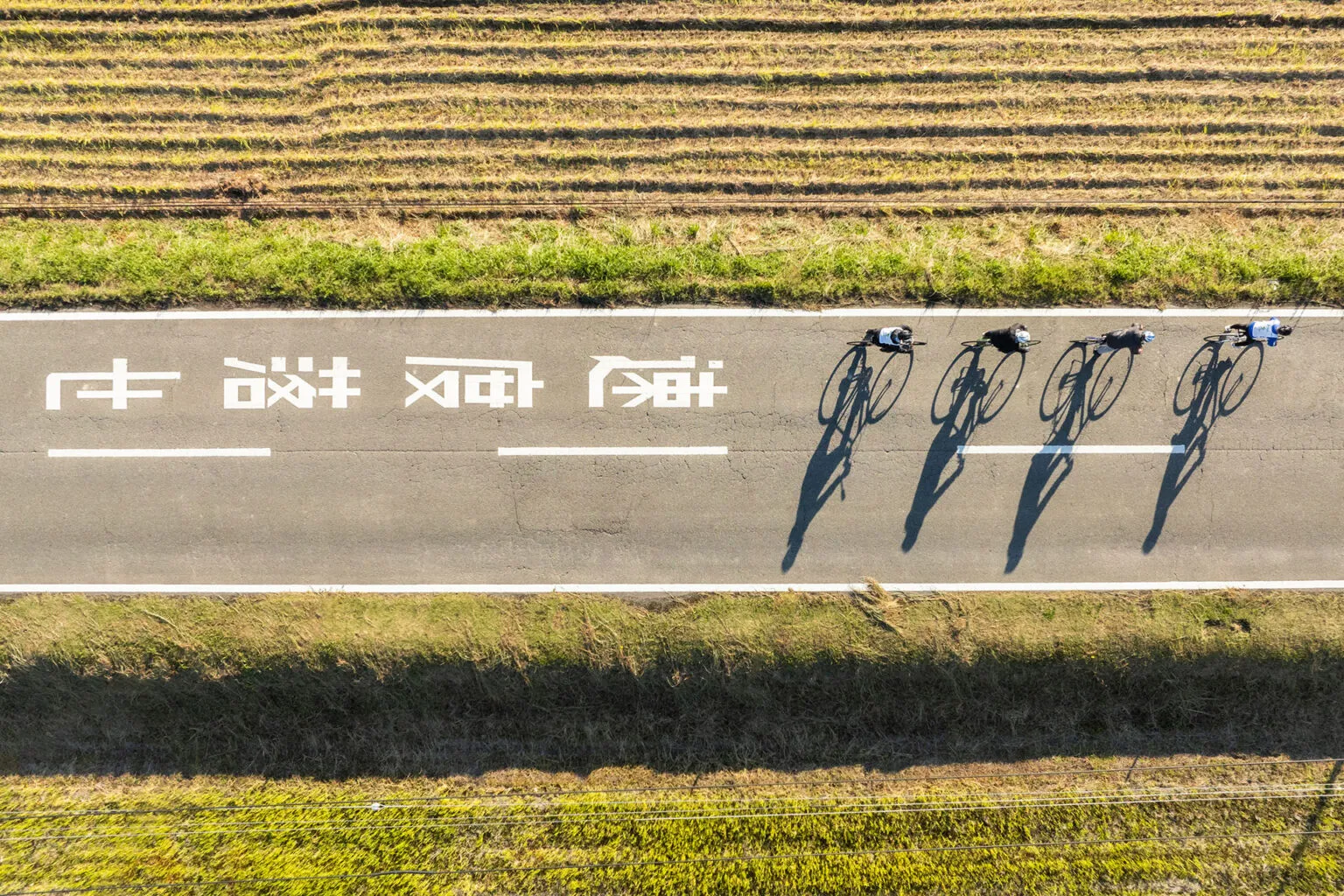
Things to Do | Visit Chiba | Latest update:2025/03/07
Contents
CyclingHikingCultural ExperiencesFarm-to-Table DiningLuxury Accommodation Contact InformationAlthough northwestern Chiba shares a border with Tokyo, the southern end of the prefecture sits a world apart from the capital’s metropolitan sprawl. With Tokyo Bay on one side, and the wide expanse of the Pacific on the other, it is here in the hills of the Boso Peninsula where visitors can experience the charms of the Japanese countryside, just a short trip from Tokyo. Whether it is via a ferry or car ride across Tokyo Bay, or an express train or highway bus from Tokyo Station, you can escape the city and find yourself immersed in the nature of the Boso Peninsula in just ninety minutes.
If you are looking to get off the beaten path during your next Tokyo trip, Boso Adventure Tours is here to help. Kenji Setogawa, founder of Boso Adventure Tours, sets out to make the Boso area accessible to visitors from all over the world. The tours on offer here involve a variety of experiences, including: cycling (e-bikes and road bikes), hiking, farm-to-table dining experiences, cultural tours, and interactions with local craftspeople. Depending on your interests, needs, and budget, Mr. Setogawa can help create a custom tour just for you, especially for those in search of highly-exclusive Japan travel experiences.
We at Visit Chiba recommend cycling as the base for your tour, but transportation can be arranged if you choose not to cycle. Team Visit Chiba has participated in a number of their tours over the years, and we’d like to provide the photos below to help you get inspired to create your own Boso Adventure Tours itinerary. Then, to make your plans a reality, please contact Mr. Setogawa through their website (link below and at the end of the article):
Boso Adventure Tours originated as a cycling tour company based out of the Heguri Hub. Mr. Setogawa established this facility in 2017 as a gathering place for the local community, tourists, and cycling clubs, and it currently serves as the main base for their cycling tours. Participants in their tours can rent both road bicycles and electric-assist bicycles.
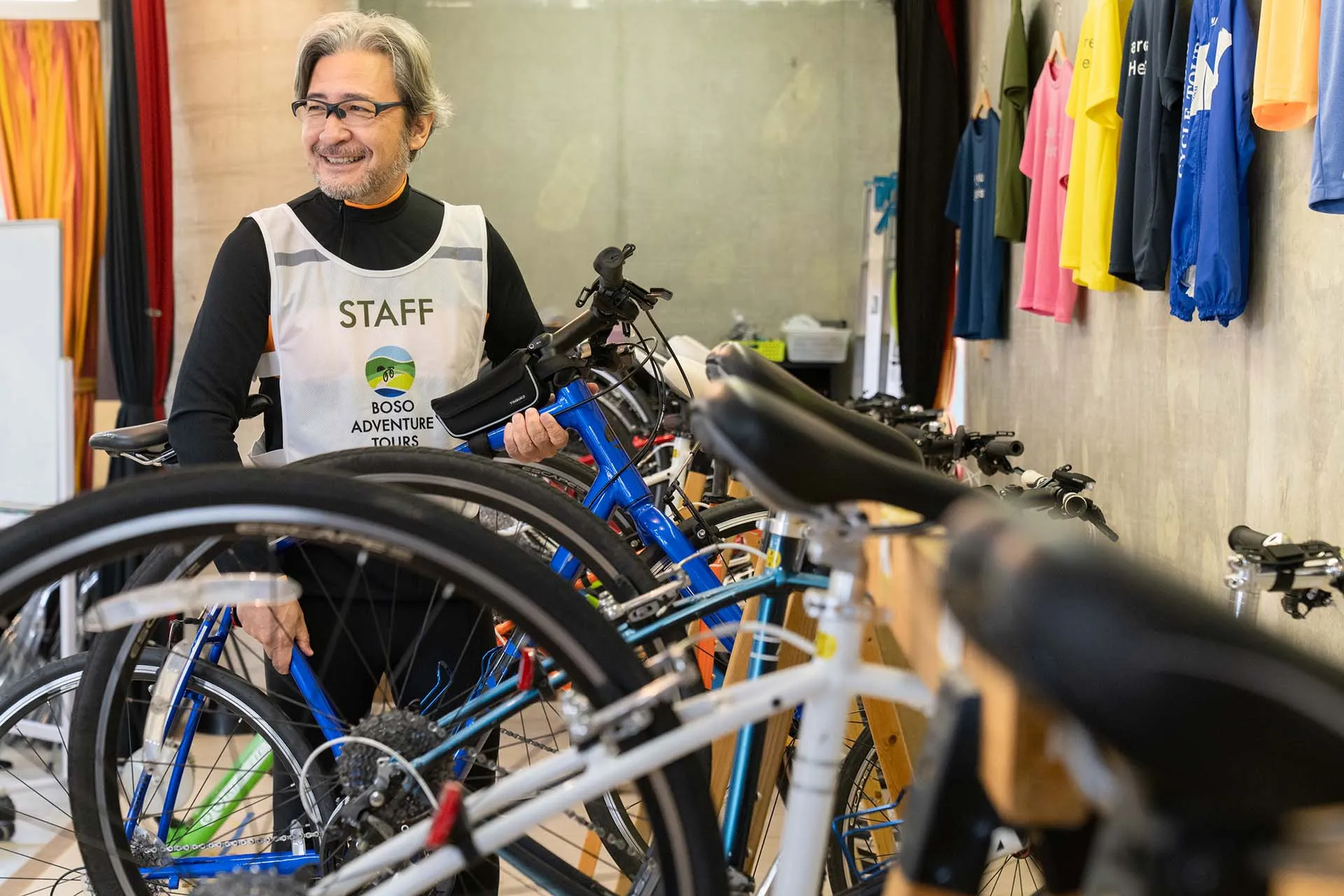 Boso Adventure Tours owner, Kenji Setogawa.
Boso Adventure Tours owner, Kenji Setogawa.
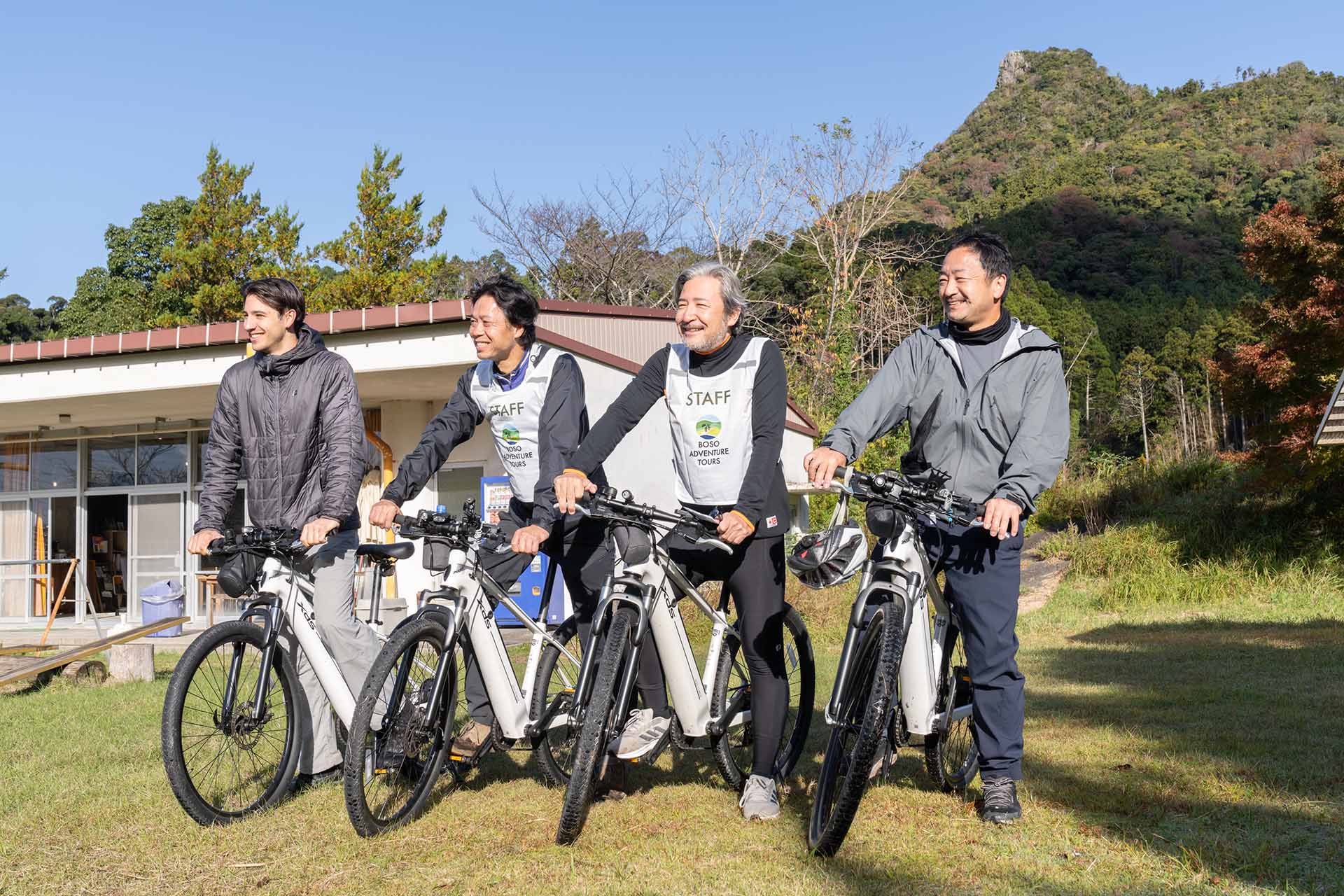 The tour's home base, the Heguri Hub.
The tour's home base, the Heguri Hub.
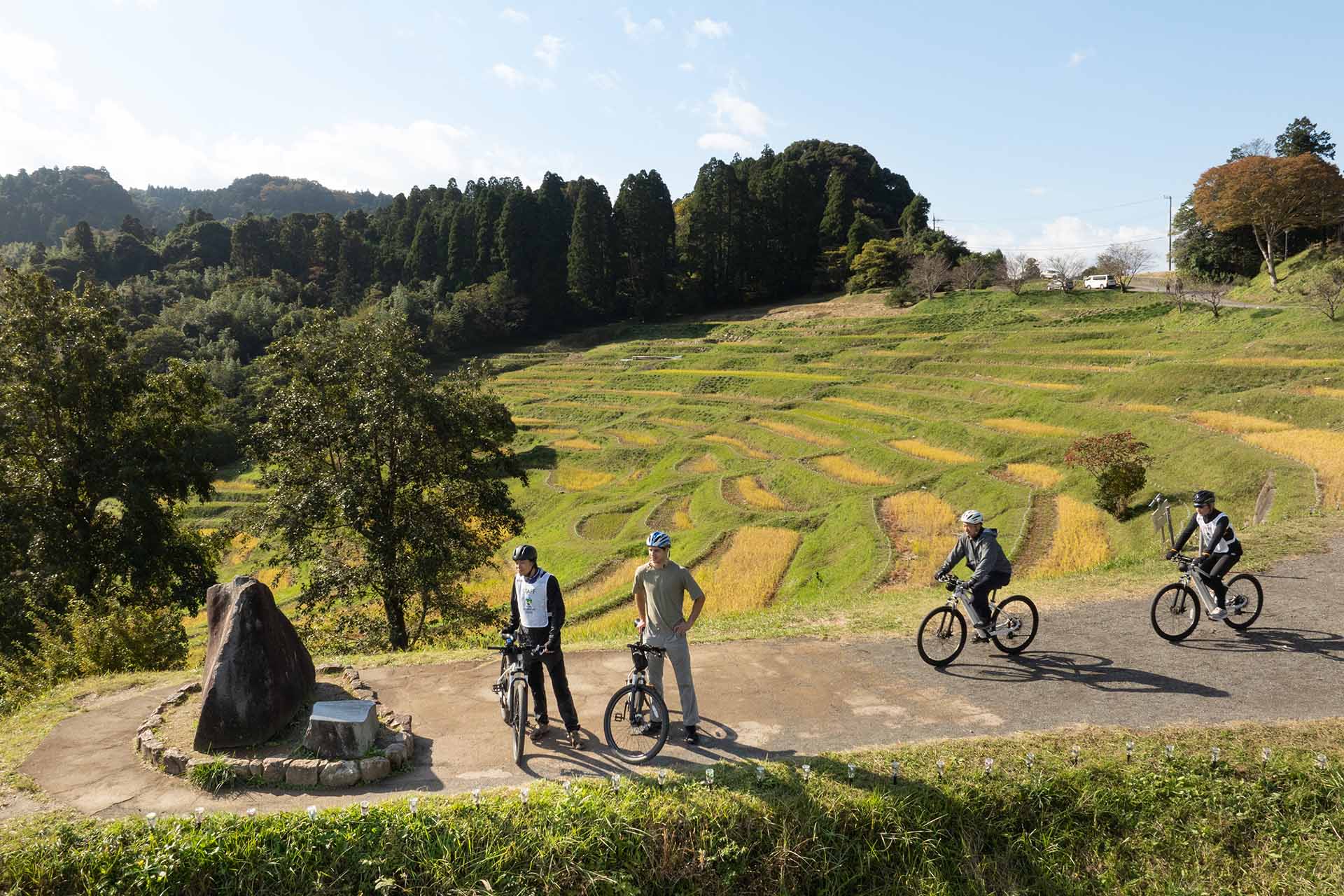 Riding to the terraced rice paddies of Oyama Senmaida.
Riding to the terraced rice paddies of Oyama Senmaida.
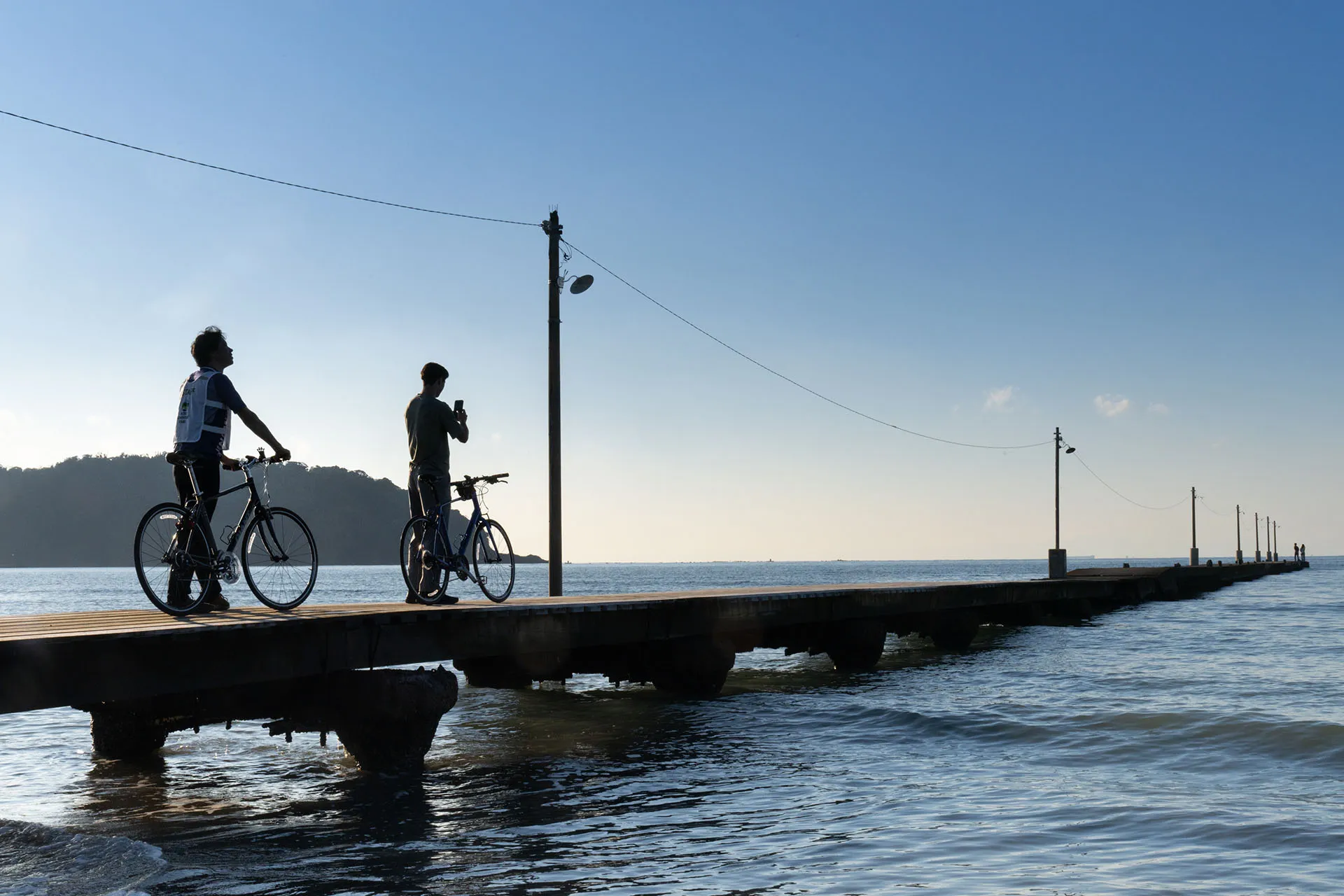 Looking out toward the sea at the Okamoto Pier at Haraoka Beach.
Looking out toward the sea at the Okamoto Pier at Haraoka Beach.
Enjoy the views and Buddhist cultural sites at Mt. Nokogiri–also known as Nokogiriyama, meaning “saw mountain” in Japanese. Boso Adventure Tours works with the local organization “WeGuide NOKOGIRIYAMA” to provide informative tours of this uniquely shaped and historically significant mountain.
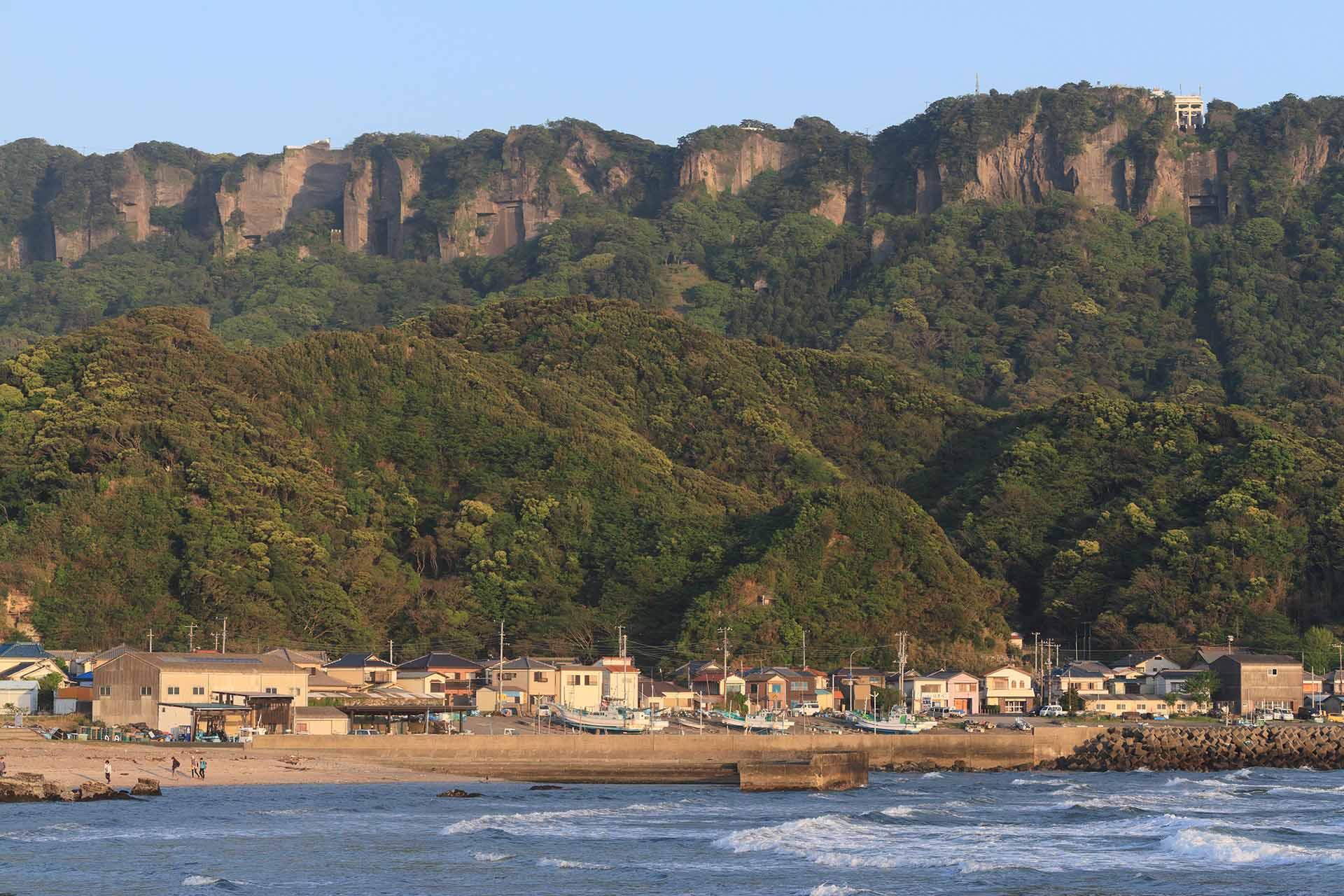 Mt Nokogiri--also known as Nokogiriyama, meaning “saw mountain” in Japanese.
Mt Nokogiri--also known as Nokogiriyama, meaning “saw mountain” in Japanese.
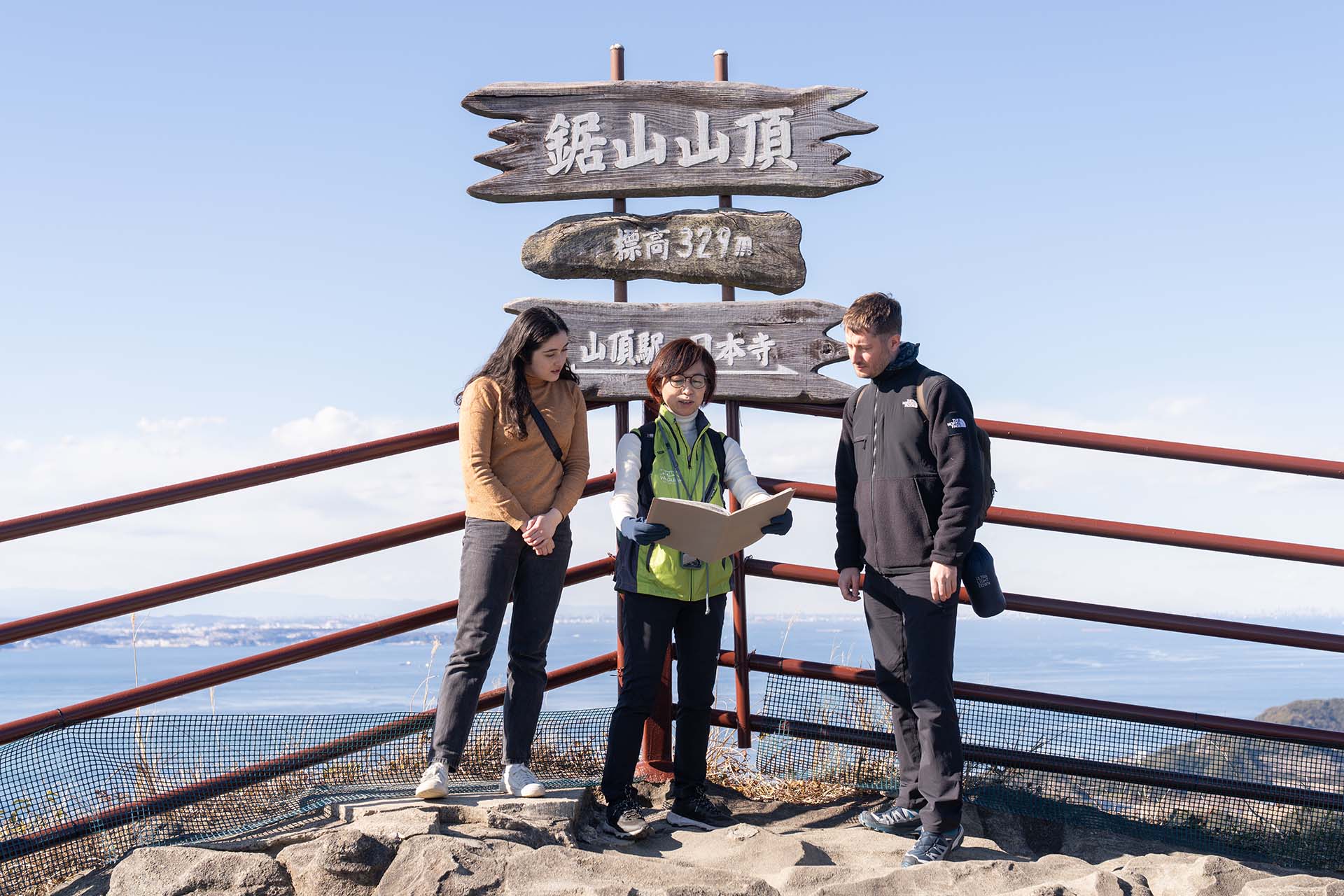 Our guide from "WeGuide NOKOGIRIYAMA" telling us about the history of this unique mountain.
Our guide from "WeGuide NOKOGIRIYAMA" telling us about the history of this unique mountain.
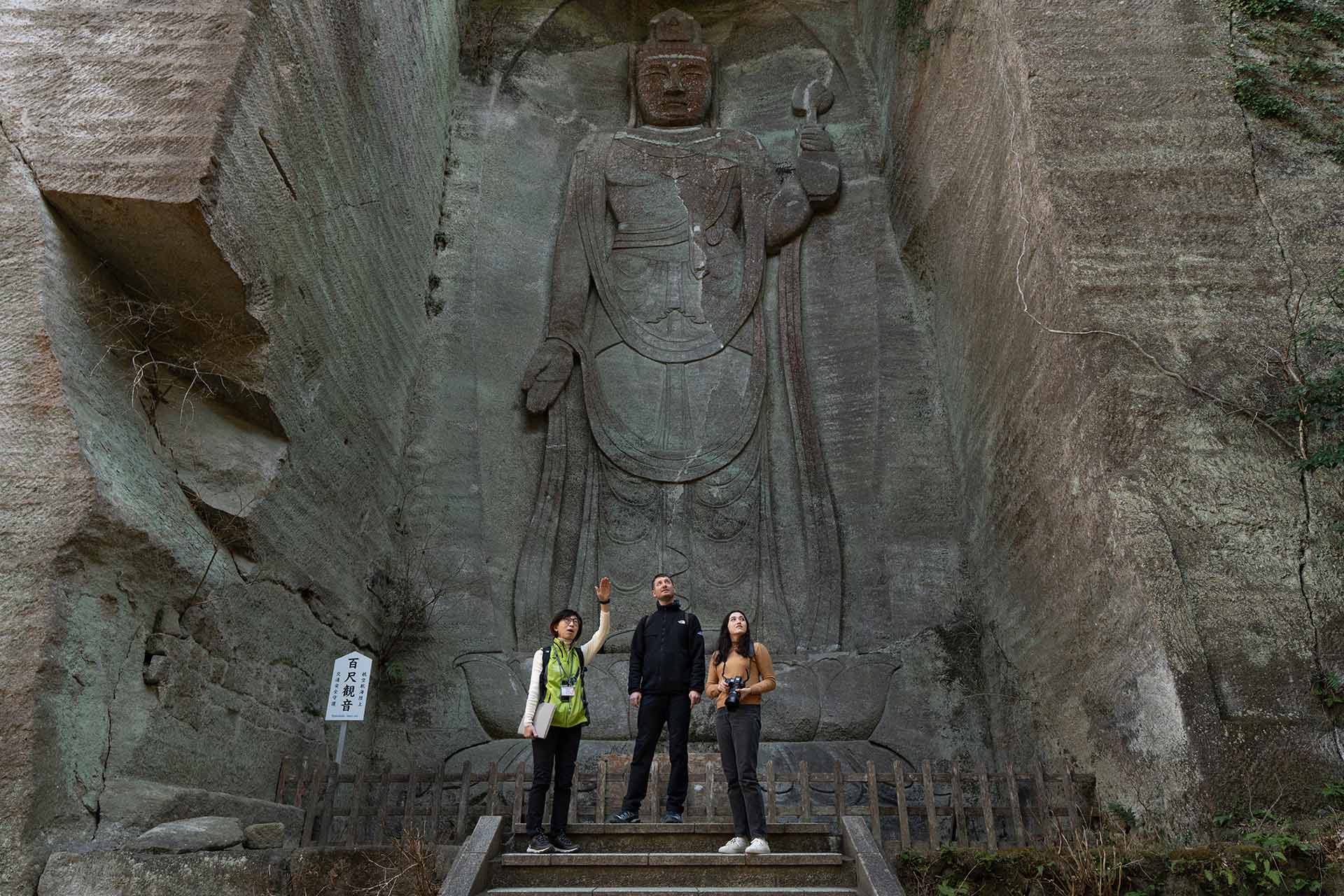 Buddhist Goddess of Mercy statue.
Buddhist Goddess of Mercy statue.
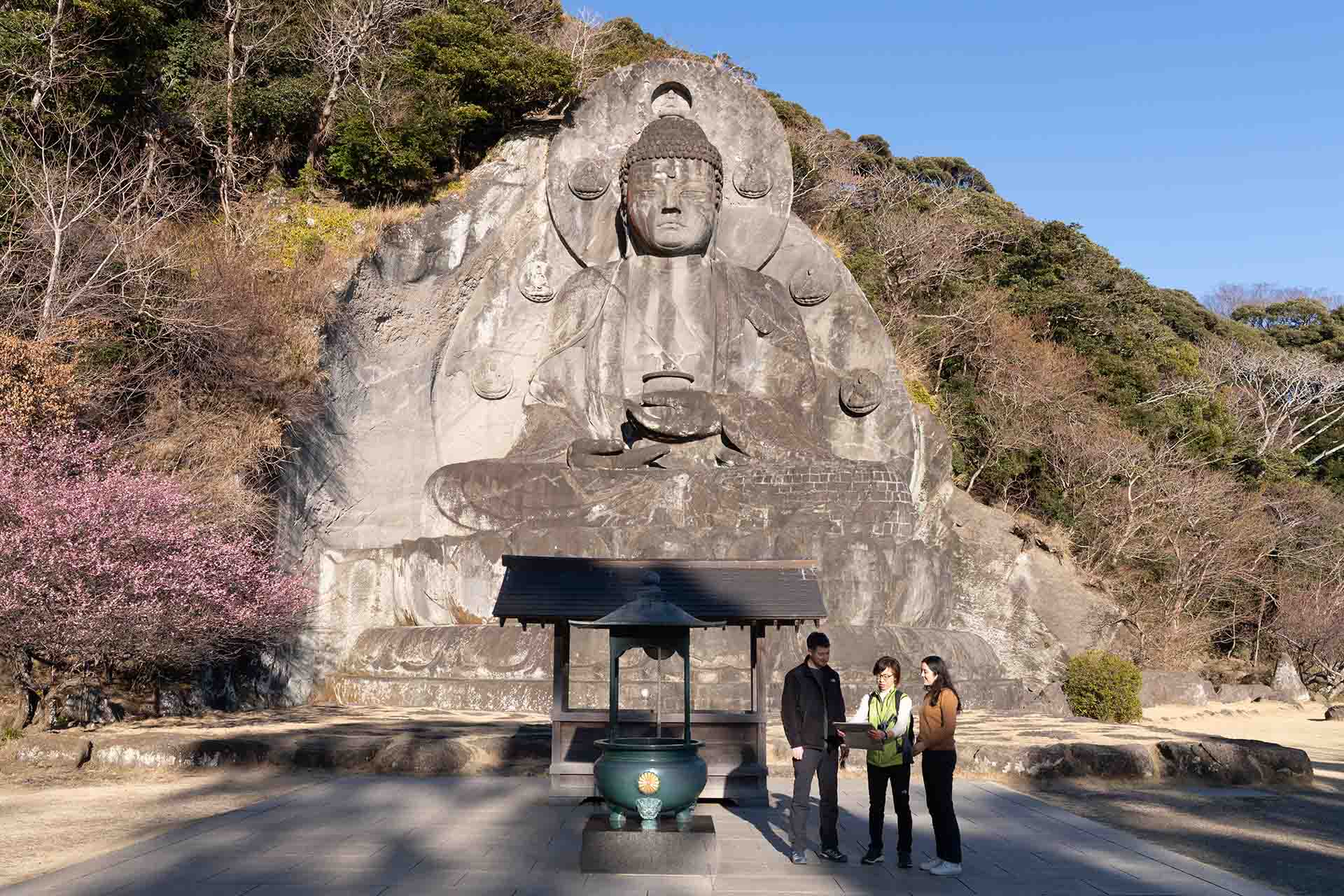 Great Stone Buddha statue.
Great Stone Buddha statue.
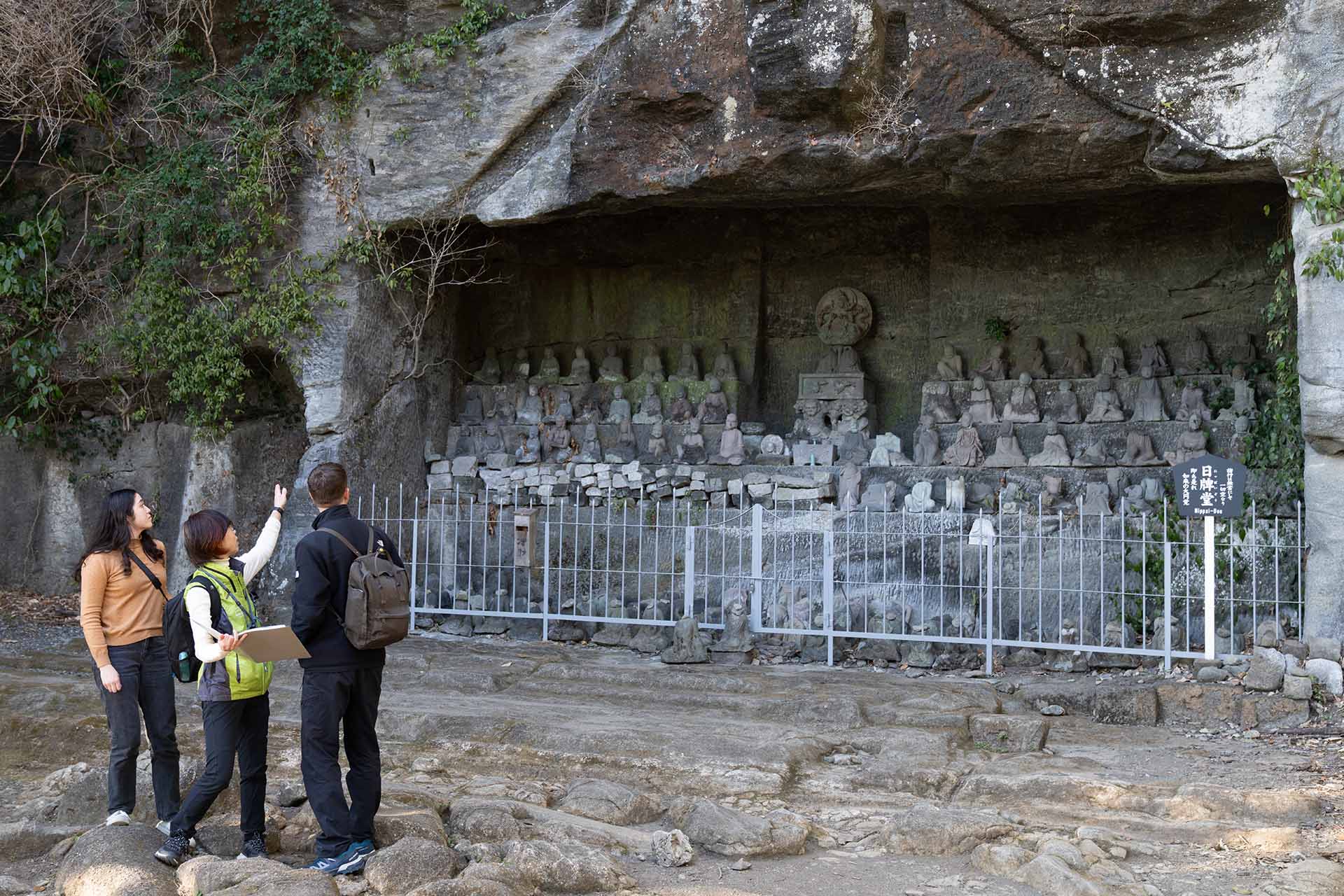 Learning about the 'rakan' statues found along the south side of the mountain.
Learning about the 'rakan' statues found along the south side of the mountain.
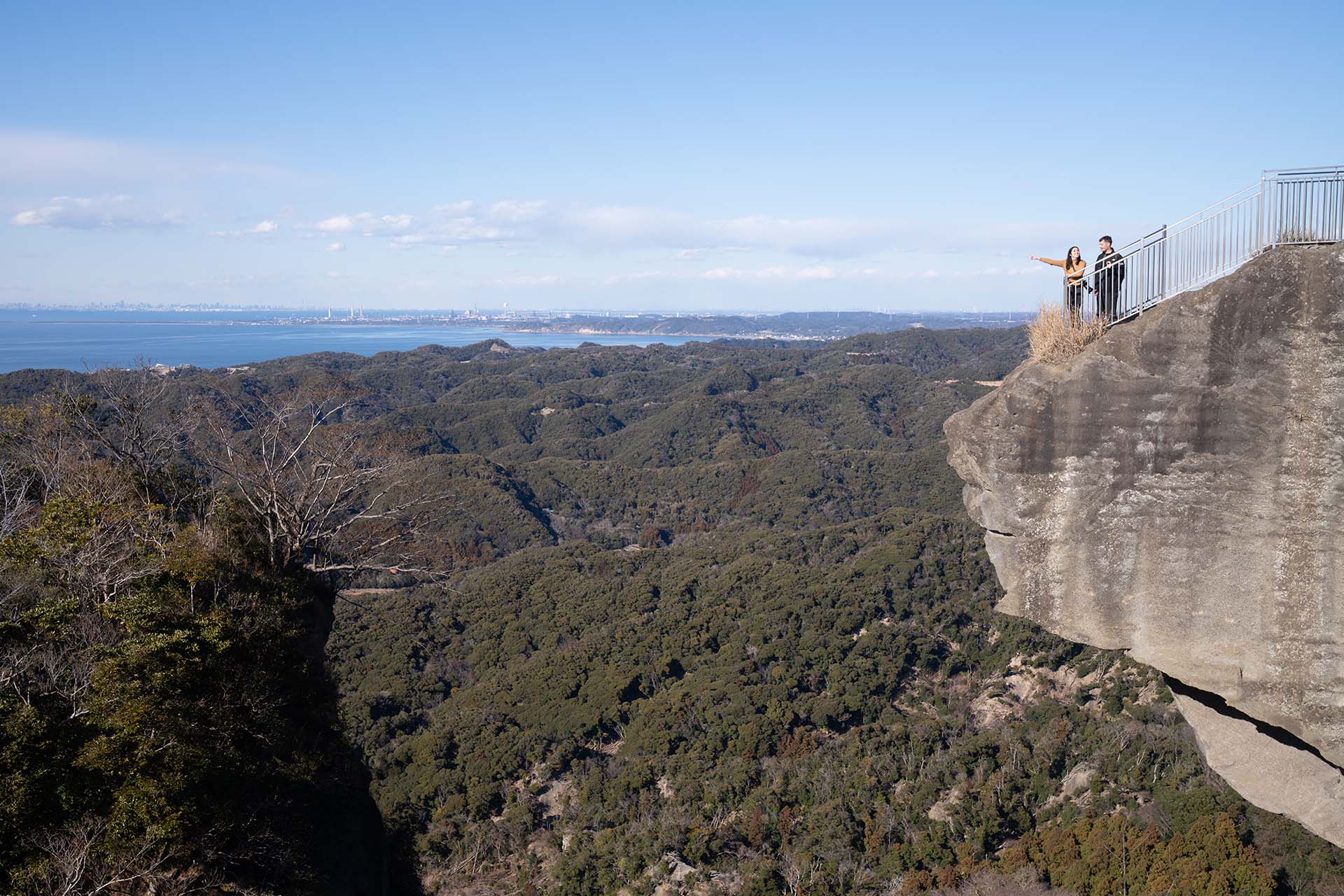 Taking in the view from the famous 'Jigoku Nozoki' or "Glimpse into Hell."
Taking in the view from the famous 'Jigoku Nozoki' or "Glimpse into Hell."
Meet the craftspeople of traditional Japanese handicrafts, including those unique to the Boso region, like Boshu Uchiwa fans and Maiwai fishermen jackets. You can also try your hand at making your own ukiyo-e print at the Hishikawa Moronobu Memorial Museum, or custom leather goods at Denemon Works. Tour historical sites as well, like the preserved home of the Japanese statesman Mikio Mizuta; and Daifuku-ji Temple, a structure also known as Gake Kannon that stunningly stands atop a cliff. If you need a rest, stop by a locally-owned business like Funakata Soko Gallery & Cafe, which features Boso-inspired works by artist Kazuo Mizoguchi.
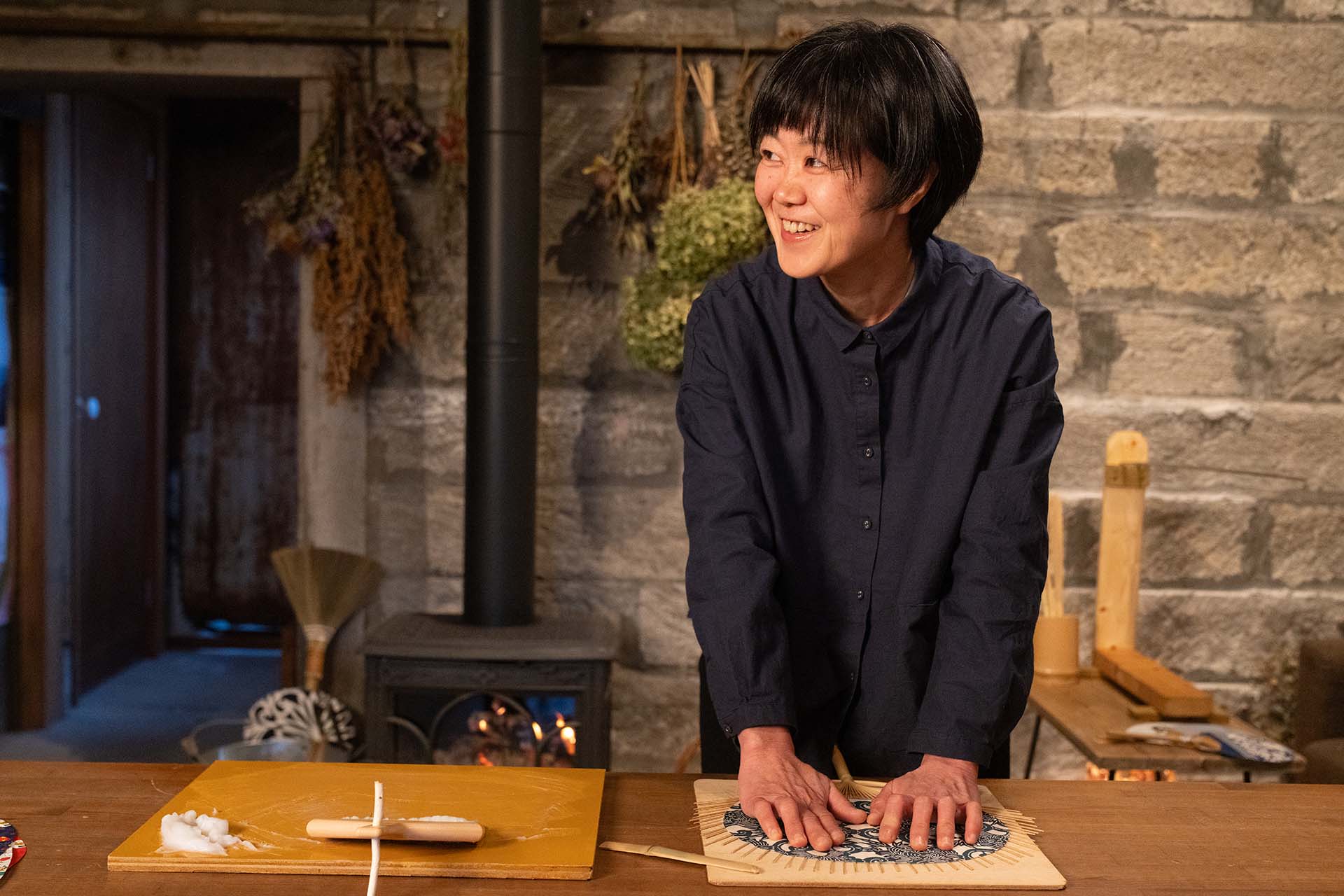 Boshu Uchiwa are one of Japan's three major brands of traditional uchiwa fans.
Boshu Uchiwa are one of Japan's three major brands of traditional uchiwa fans.
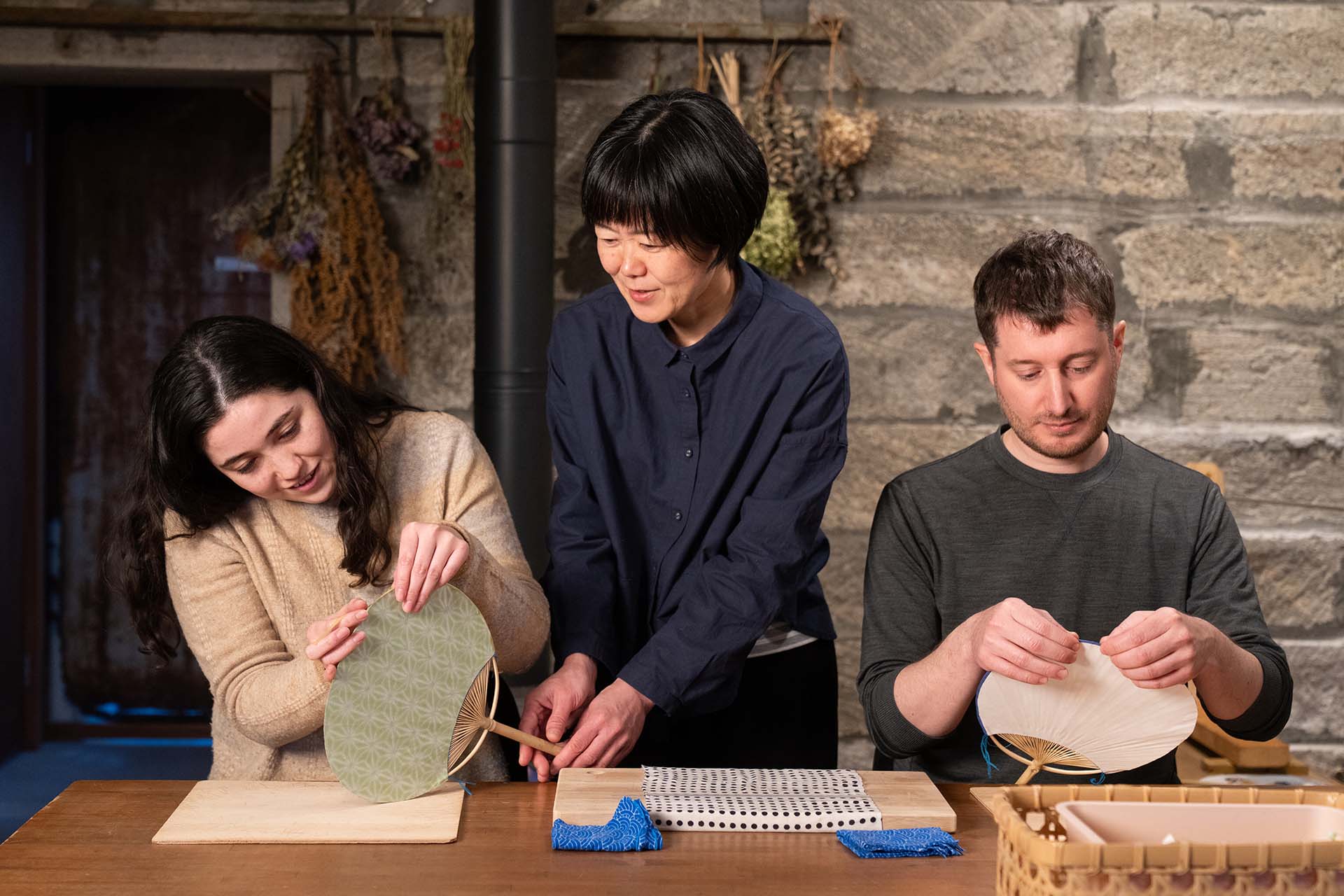 Certified Boshu Uchiwa artisans gave us a lesson and helped us make our own.
Certified Boshu Uchiwa artisans gave us a lesson and helped us make our own.
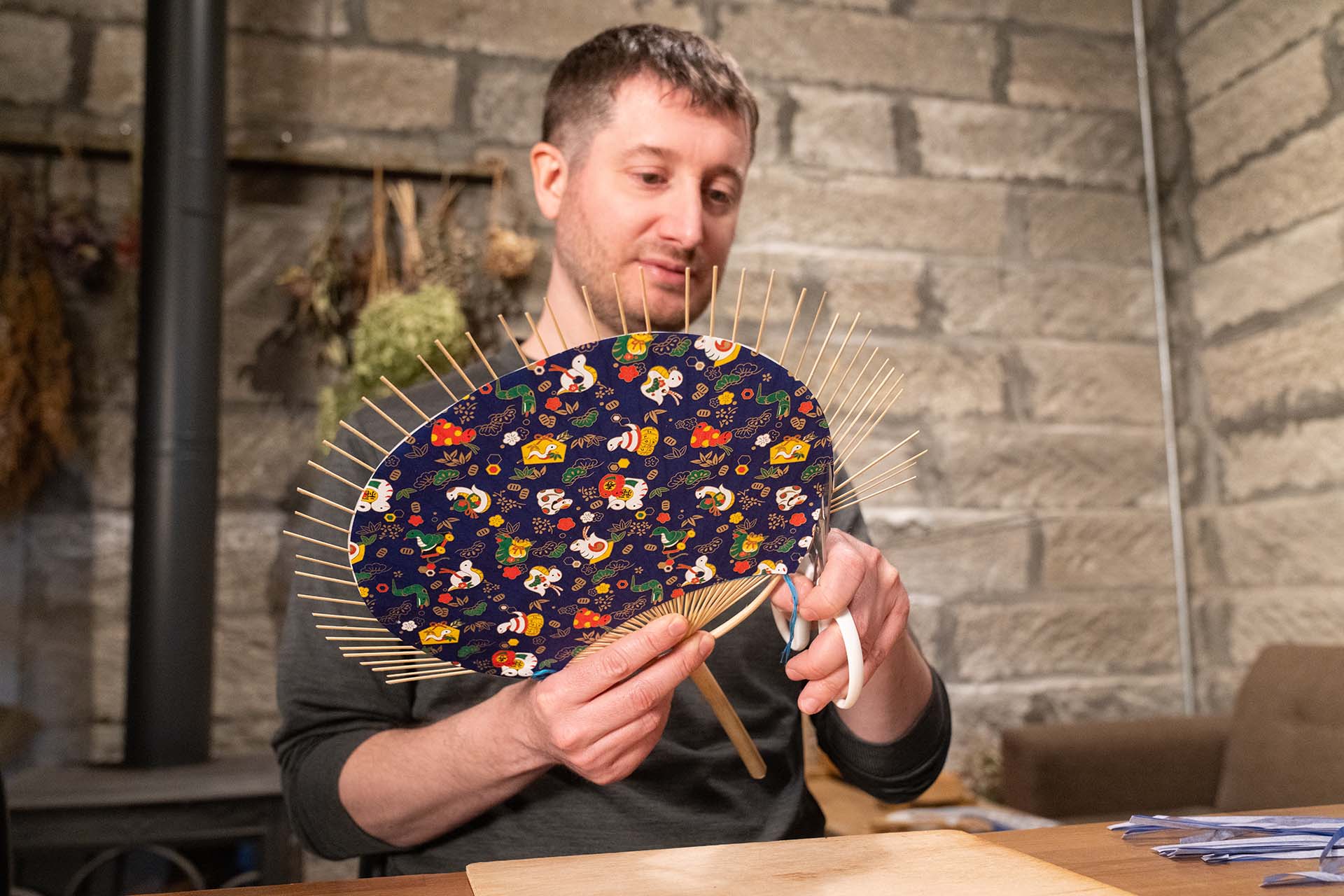 We selected our own patterns, affixed them to the frame, and performed the finishing touches.
We selected our own patterns, affixed them to the frame, and performed the finishing touches.
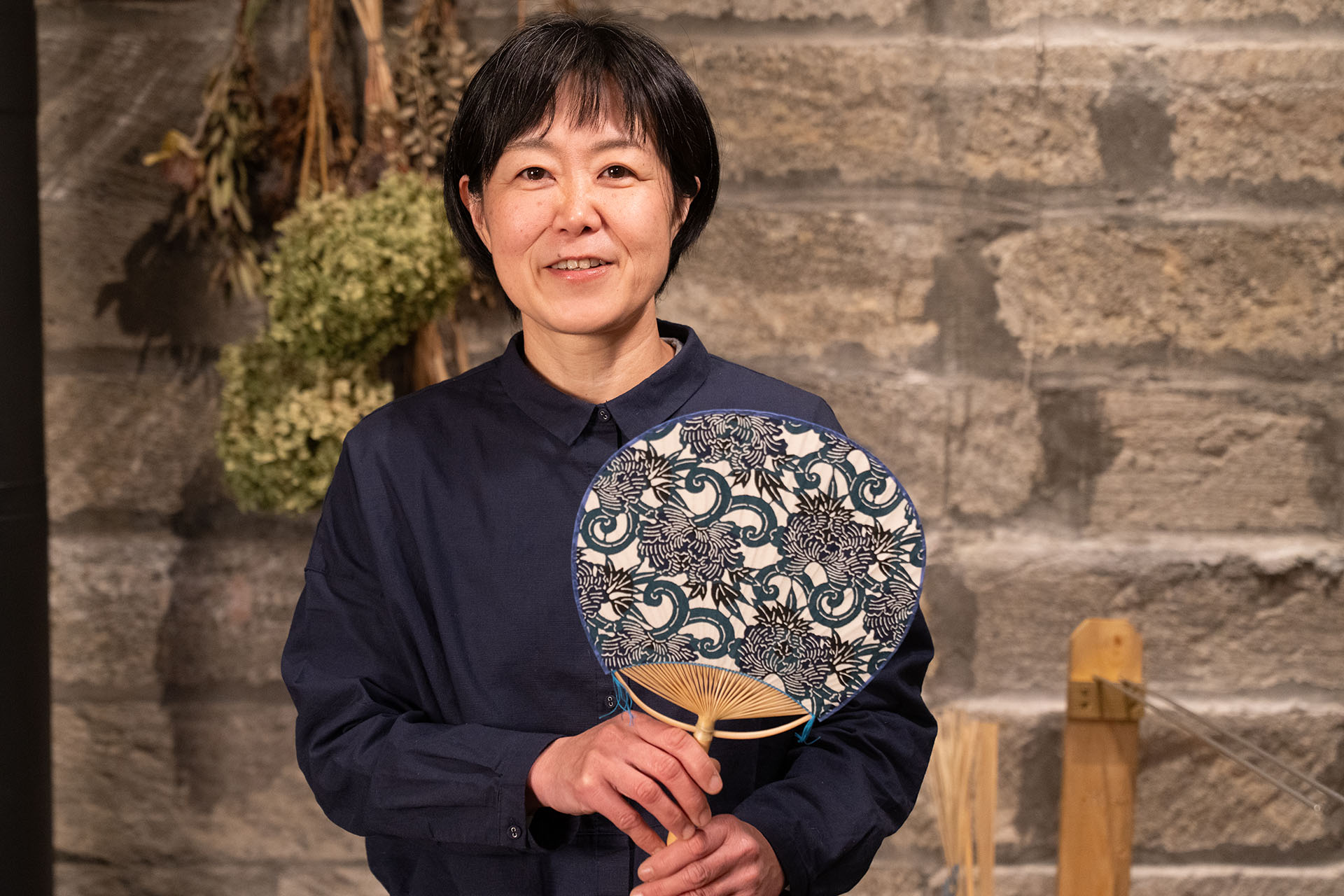 These uchiwa have a unique design, known as maru-e, or literally “round handles” and are made from a type of bamboo called 'medake.'
These uchiwa have a unique design, known as maru-e, or literally “round handles” and are made from a type of bamboo called 'medake.'
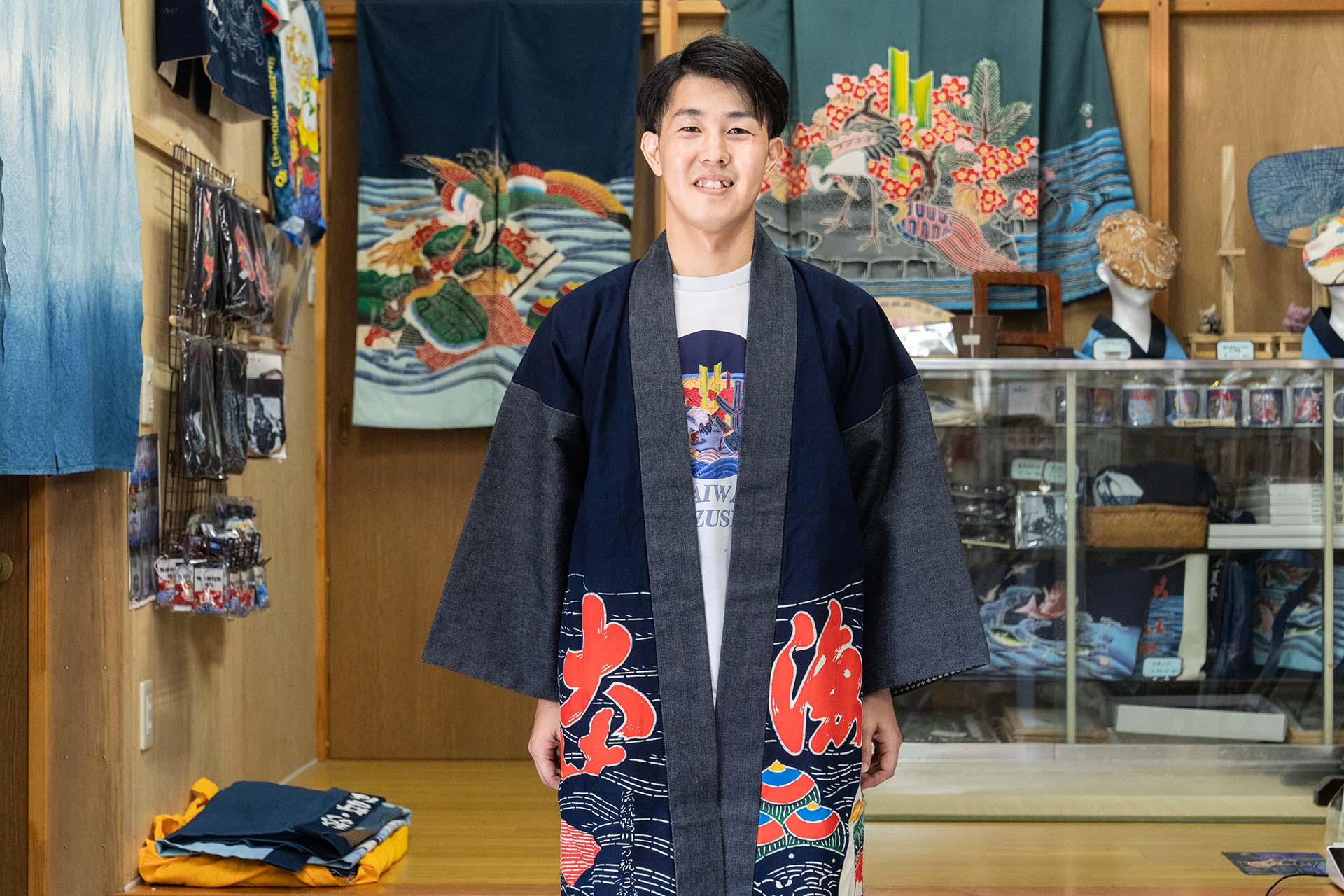 Riki Suzuki is one of the few remaining makers of Maiwai fishermen jackets.
Riki Suzuki is one of the few remaining makers of Maiwai fishermen jackets.
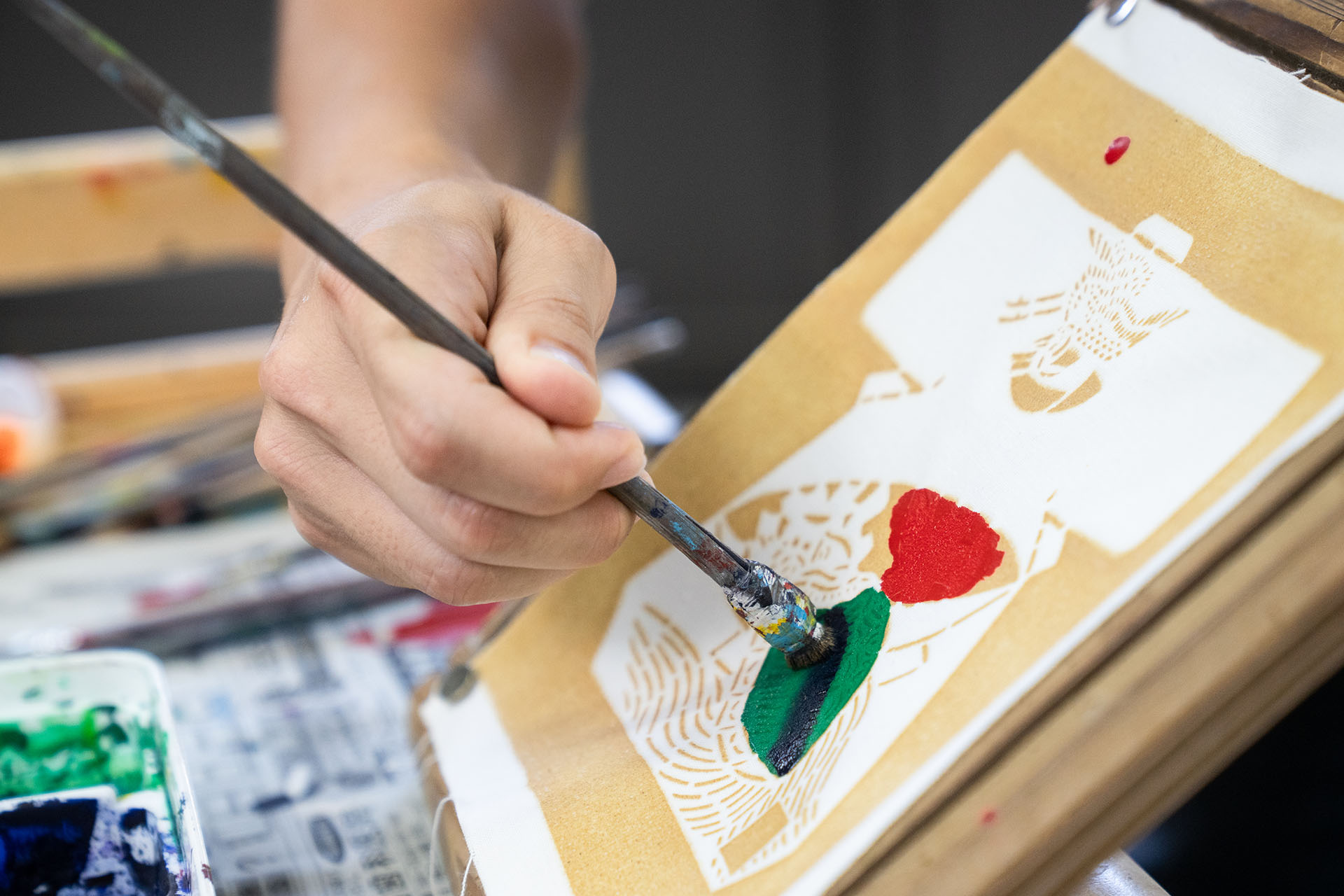 Maiwai is a traditional dyeing art which developed in Boso during the Edo period.
Maiwai is a traditional dyeing art which developed in Boso during the Edo period.
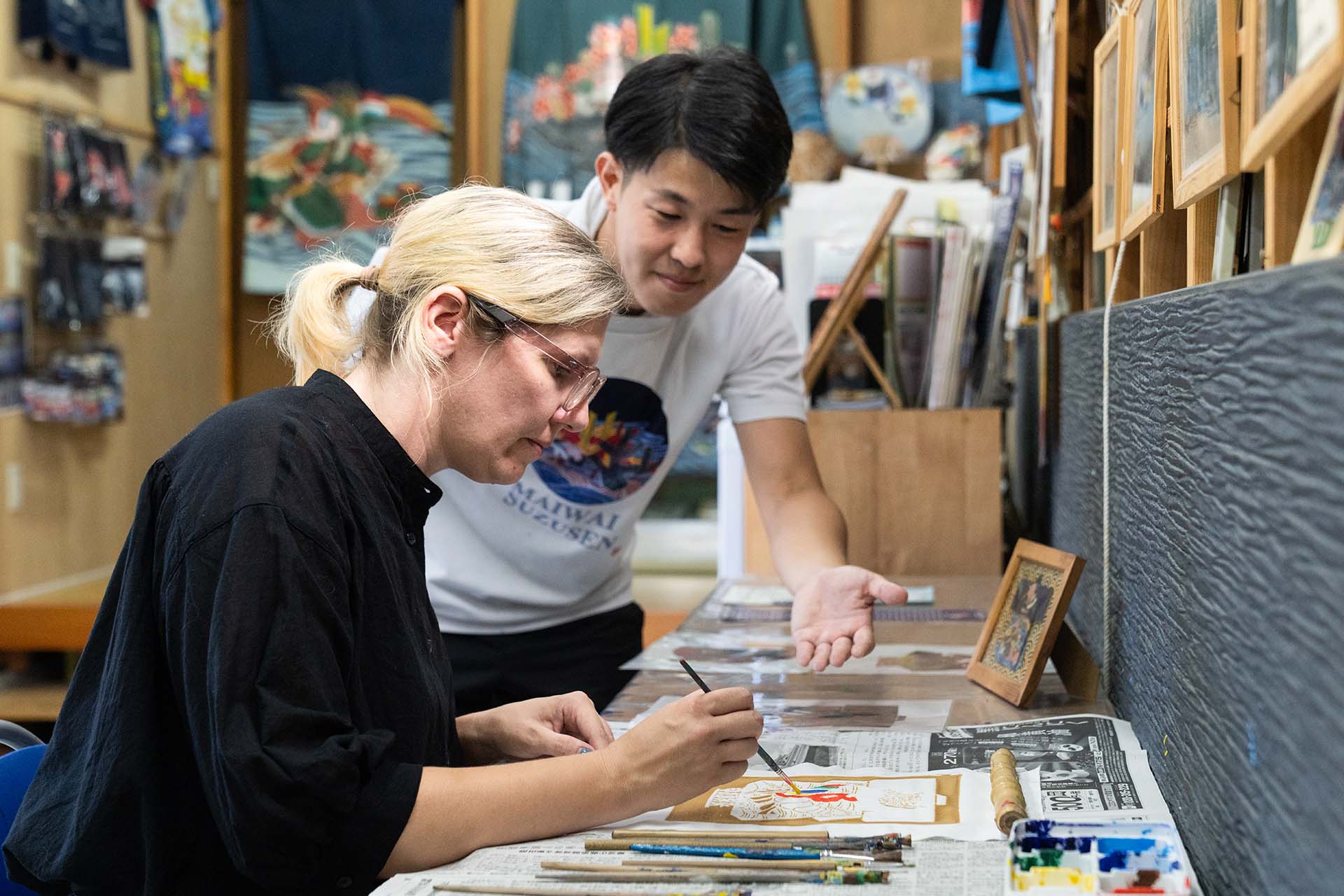 Join a workshop where you make your own Maiwai design print.
Join a workshop where you make your own Maiwai design print.
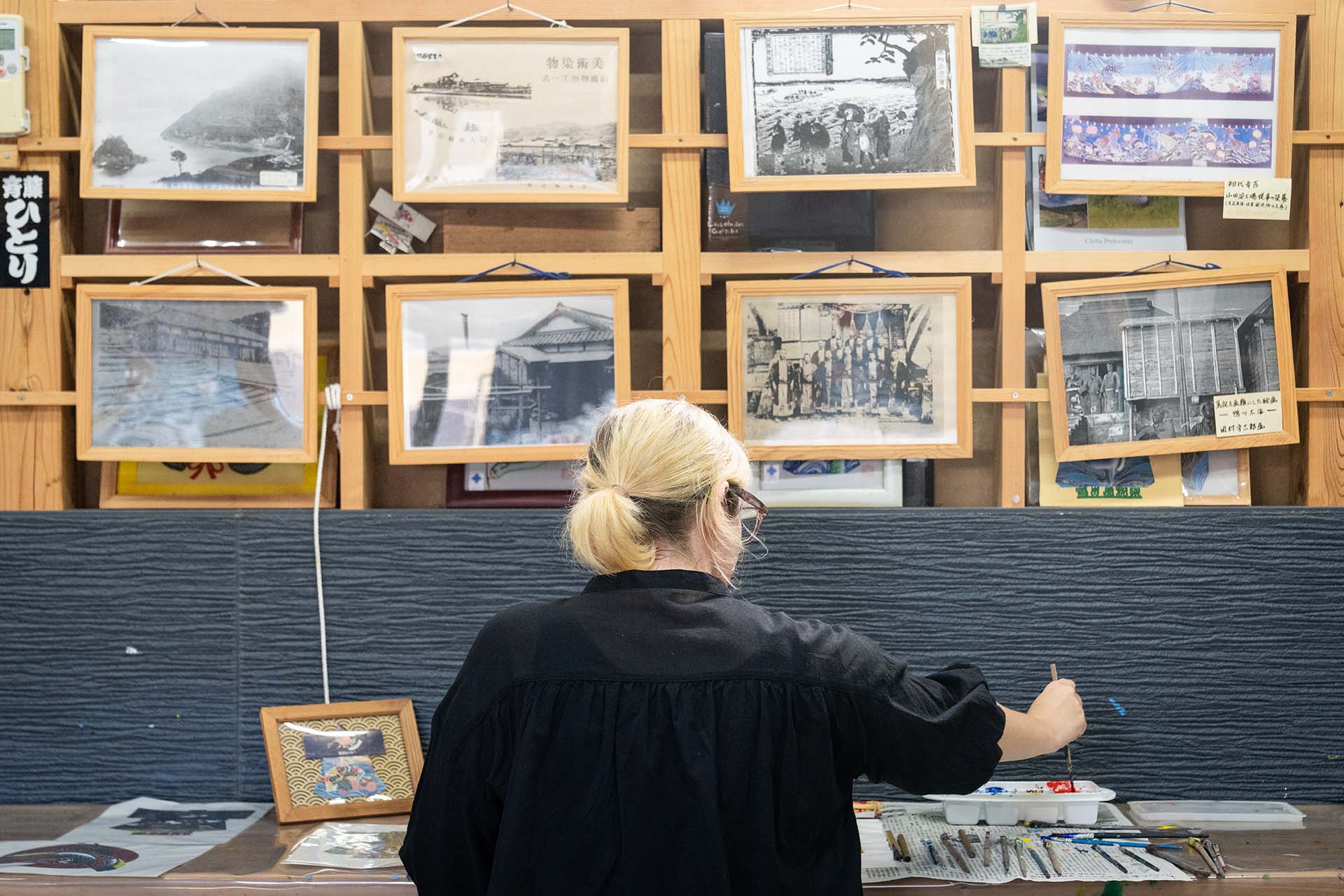 Learn about the centuries-long legacy of Maiwai from this 4th generation craftsman.
Learn about the centuries-long legacy of Maiwai from this 4th generation craftsman.
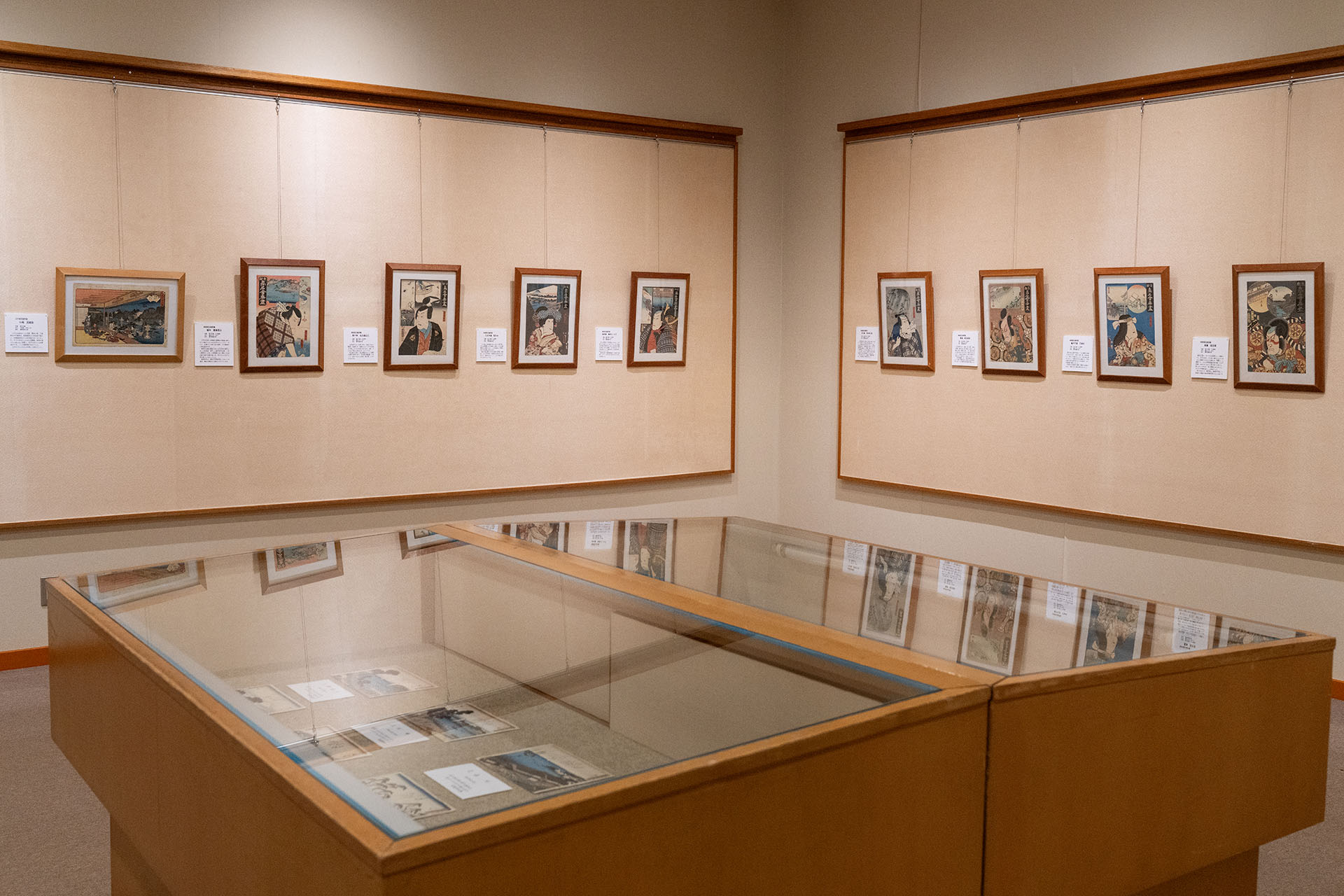 Learn about ukiyo-e and the collection at the Hishikawa Moronobu Memorial Museum.
Learn about ukiyo-e and the collection at the Hishikawa Moronobu Memorial Museum.
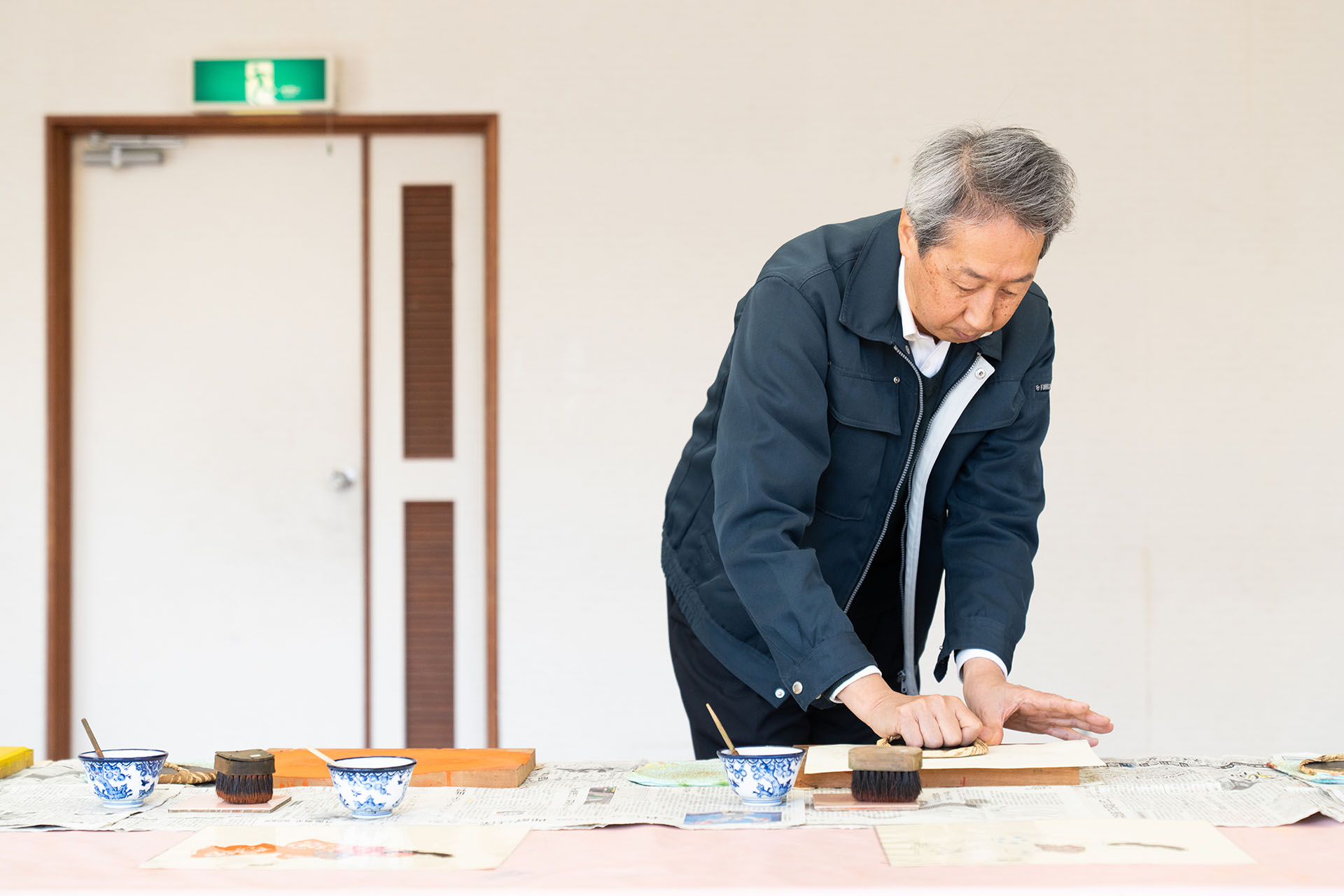 After touring the museum with Mr. Saso, he leads a ukiyo-e making workshop.
After touring the museum with Mr. Saso, he leads a ukiyo-e making workshop.
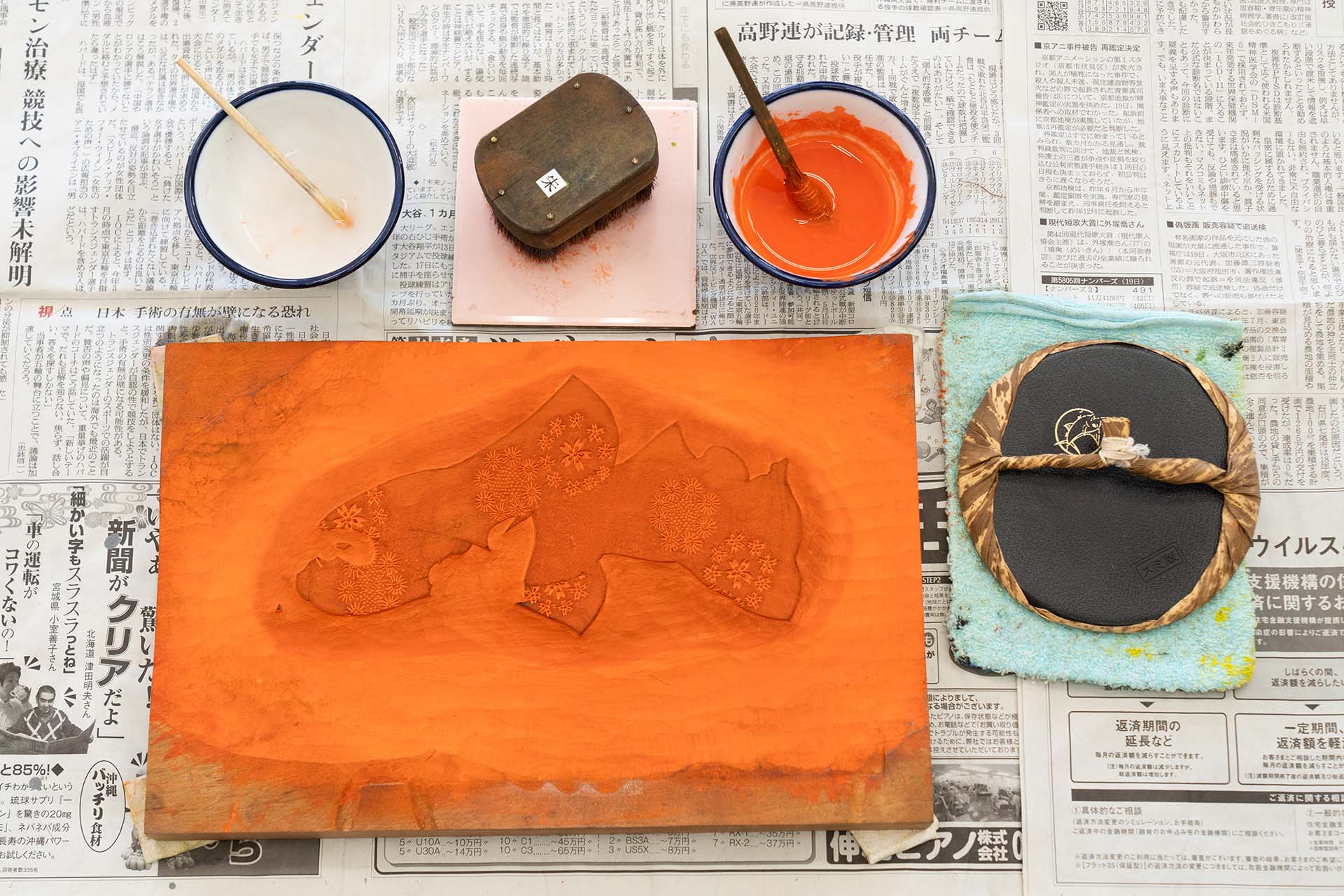 Use a traditional wood block to produce your own ukiyo-e.
Use a traditional wood block to produce your own ukiyo-e.
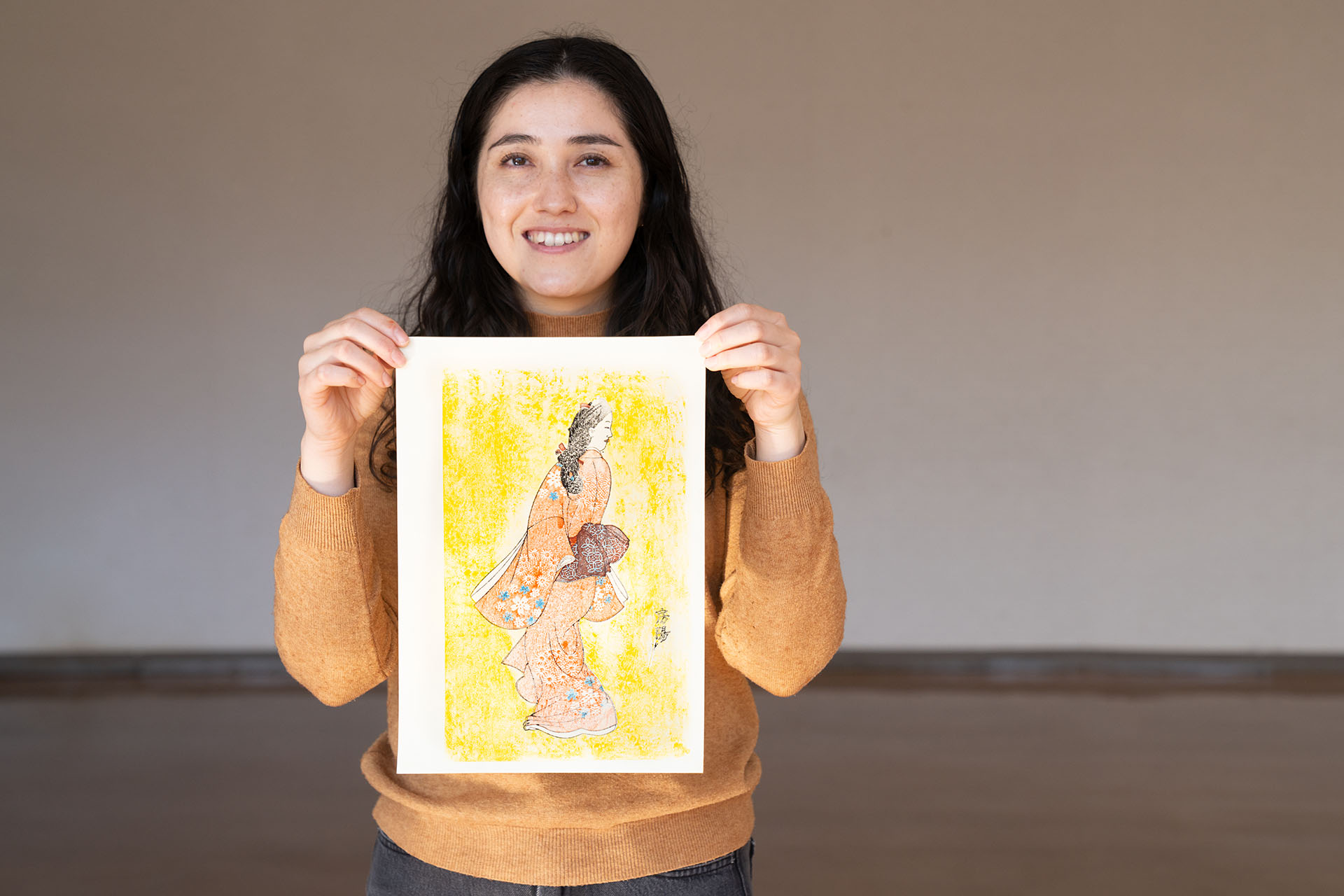 Our print of Moronobu's work "Beauty Looking Back."
Our print of Moronobu's work "Beauty Looking Back."
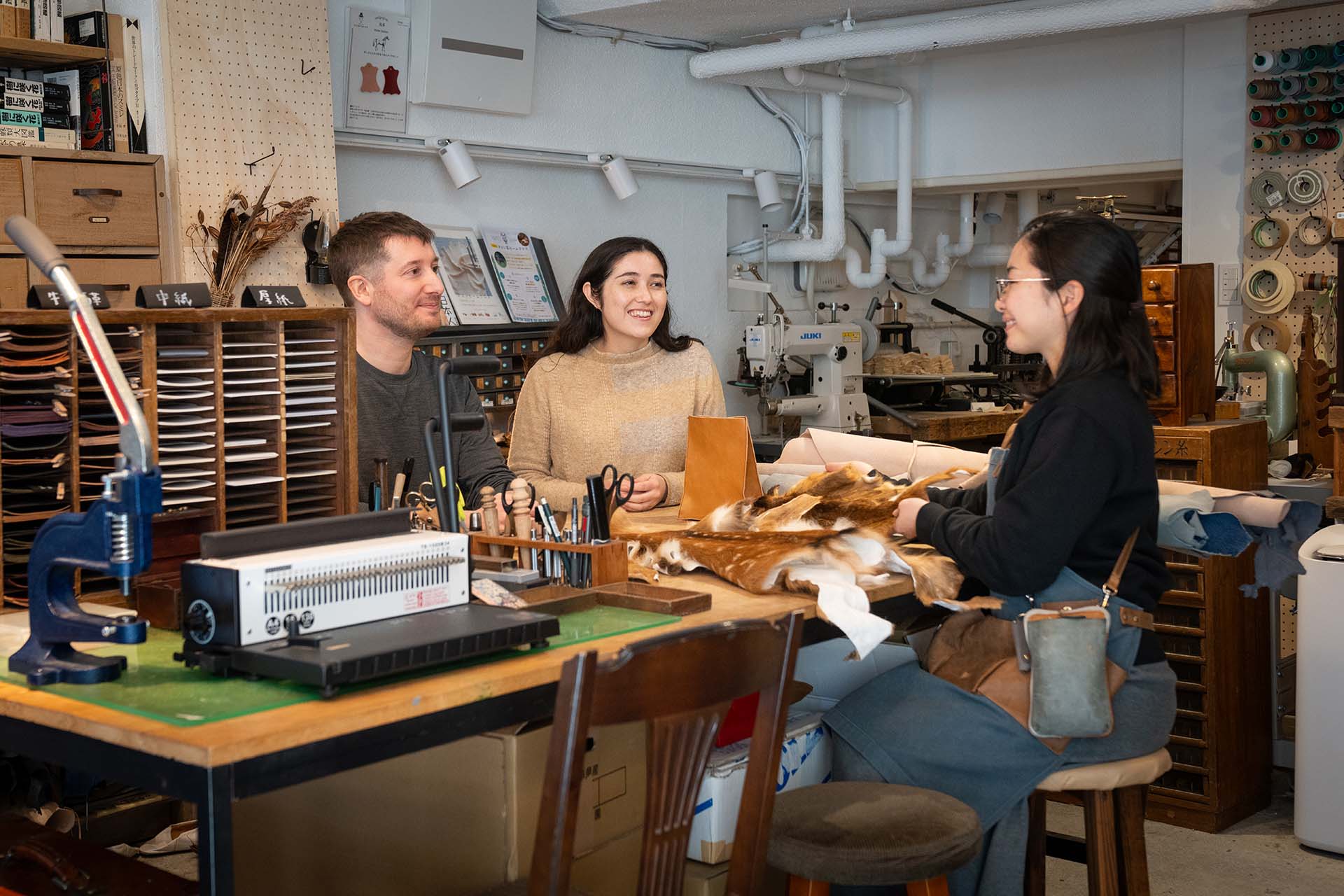 Miku Osakadani runs Denemon Works where she makes handcrafted leather goods.
Miku Osakadani runs Denemon Works where she makes handcrafted leather goods.
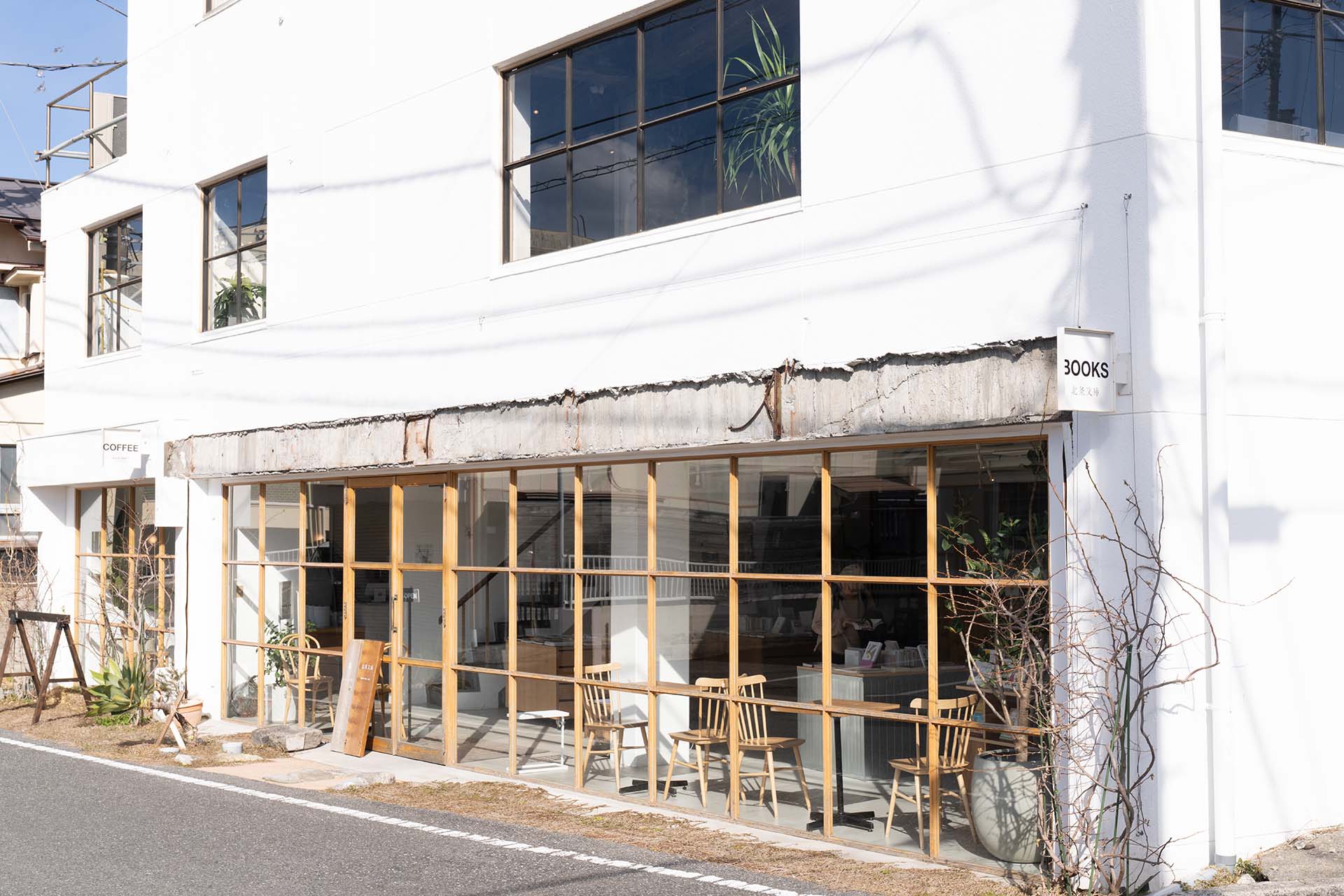 Her shop is located in Yane Tateyama, a restored structure housing a bookstore and café, an Italian restaurant, and lodging.
Her shop is located in Yane Tateyama, a restored structure housing a bookstore and café, an Italian restaurant, and lodging.
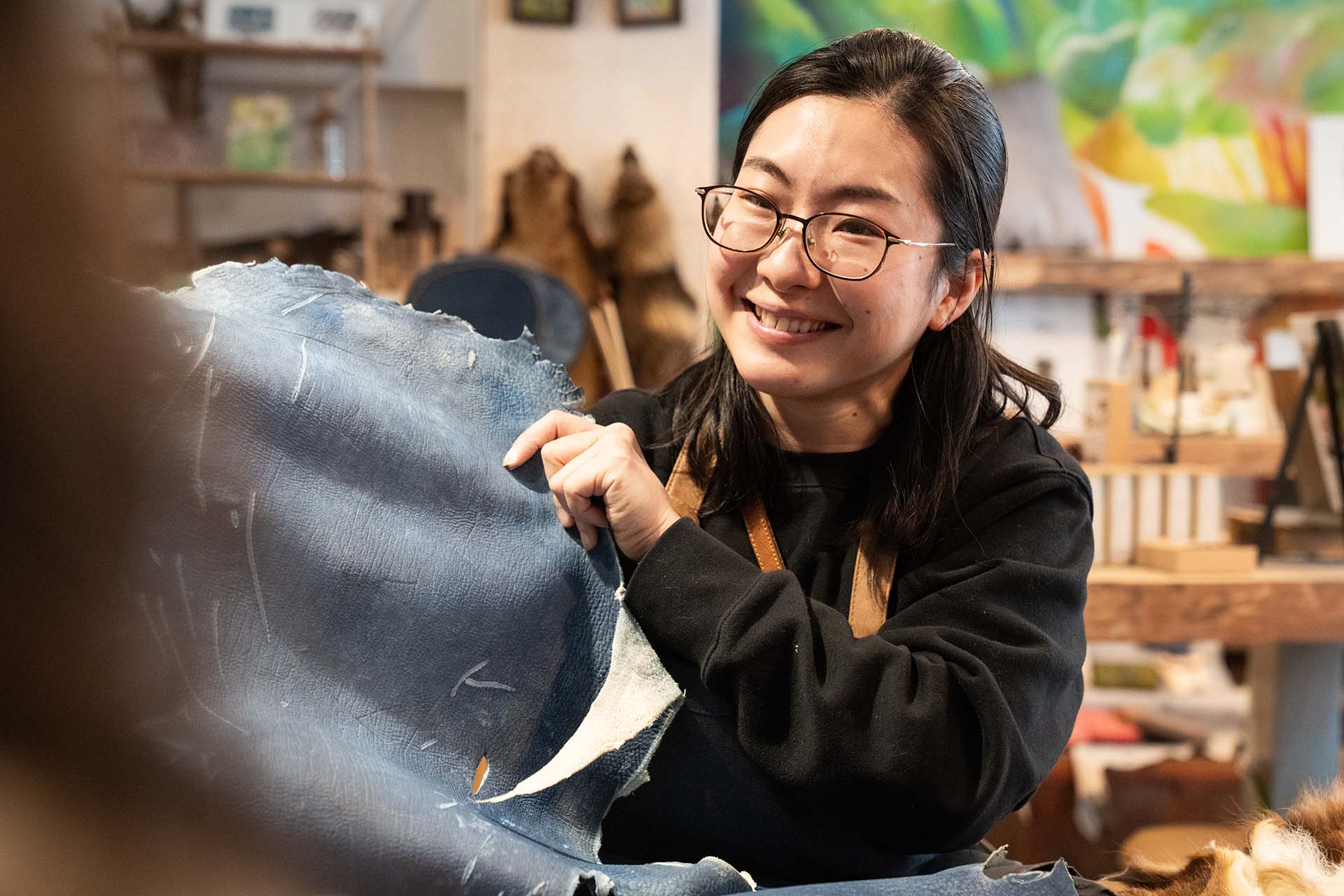 She works with local hunters of invasive species, striving to make use of animal skins in a sustainable way.
She works with local hunters of invasive species, striving to make use of animal skins in a sustainable way.
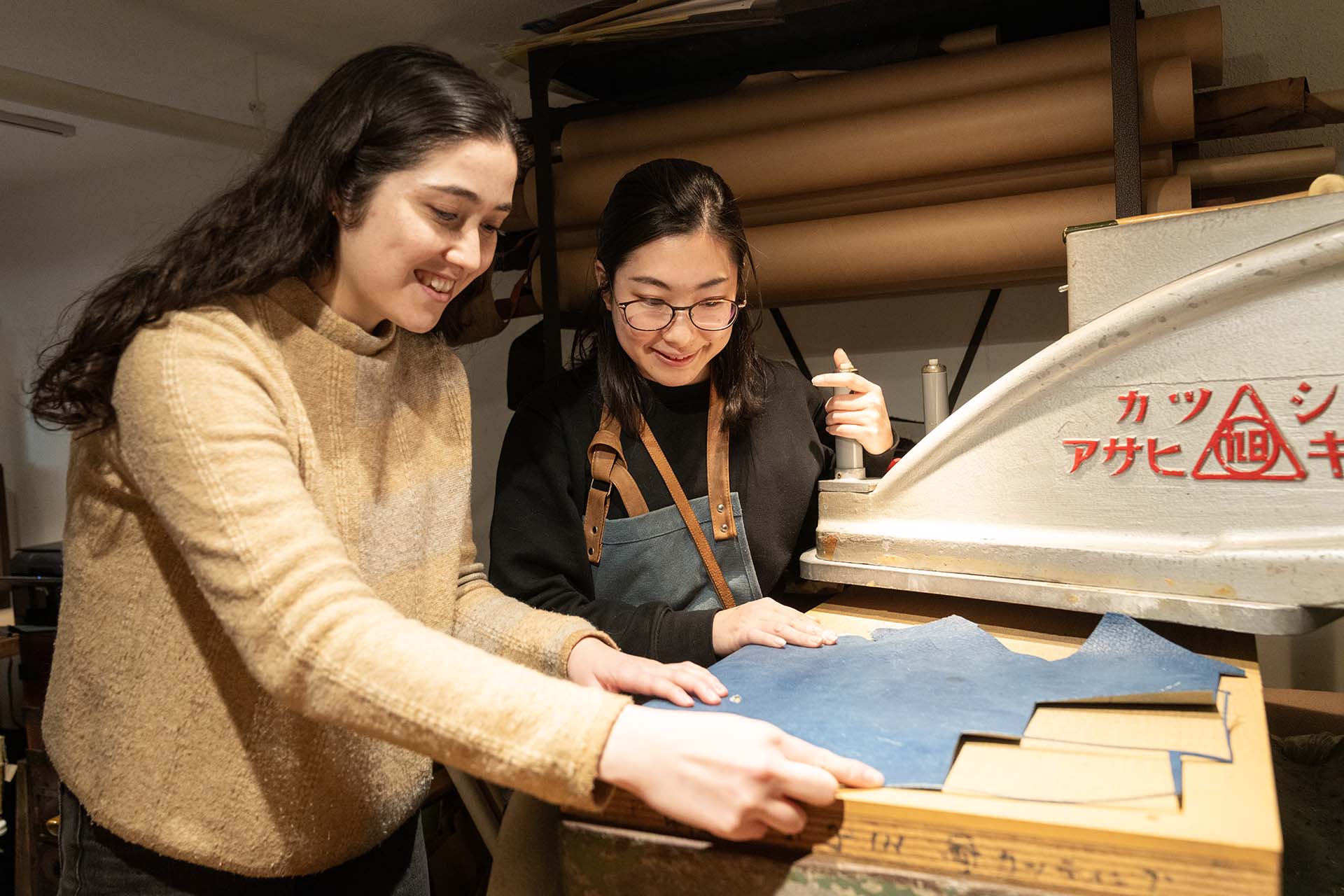 She led us through the process of making our own leather-covered notebooks.
She led us through the process of making our own leather-covered notebooks.
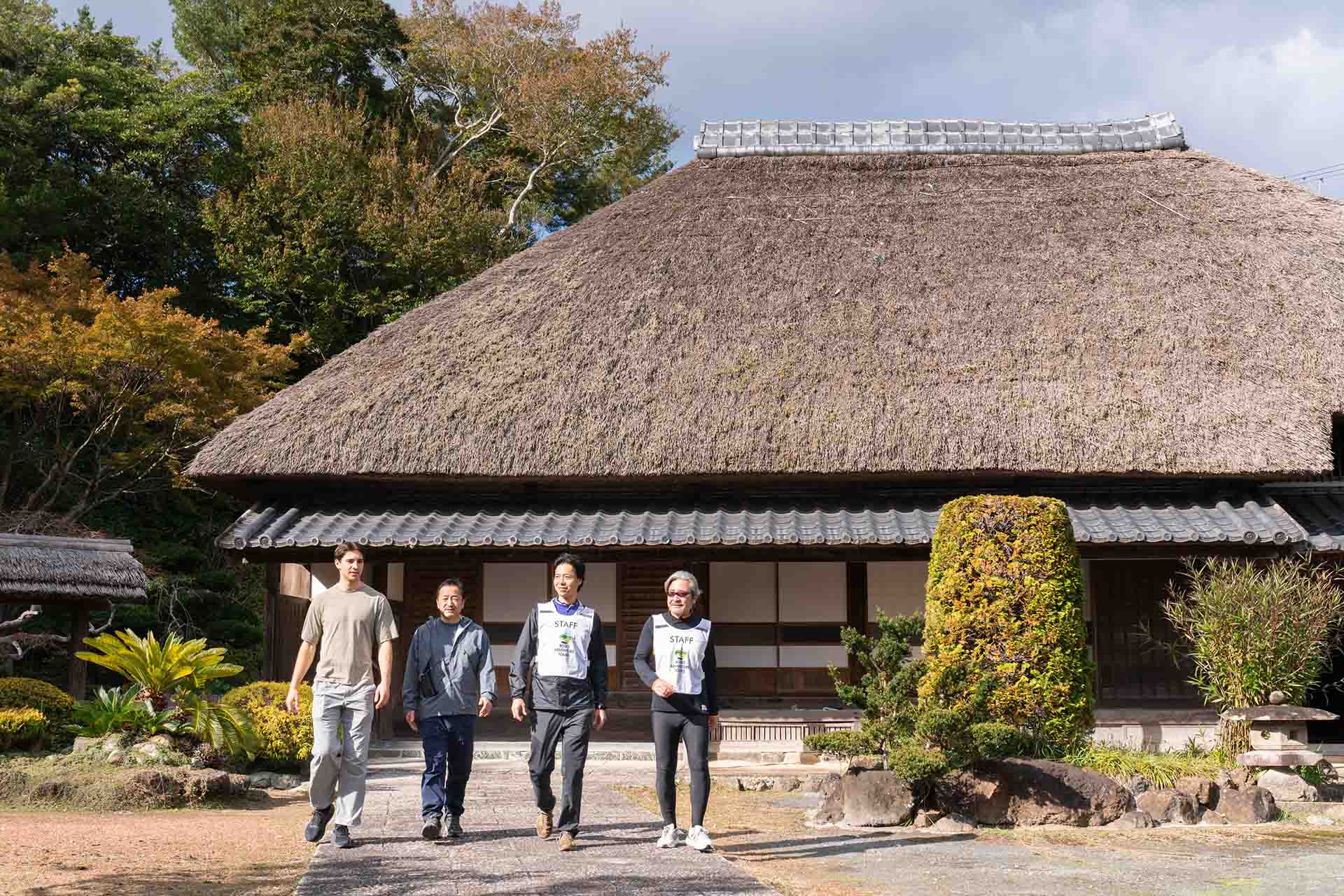 Tour the Former Mizuta Family Residence.
Tour the Former Mizuta Family Residence.
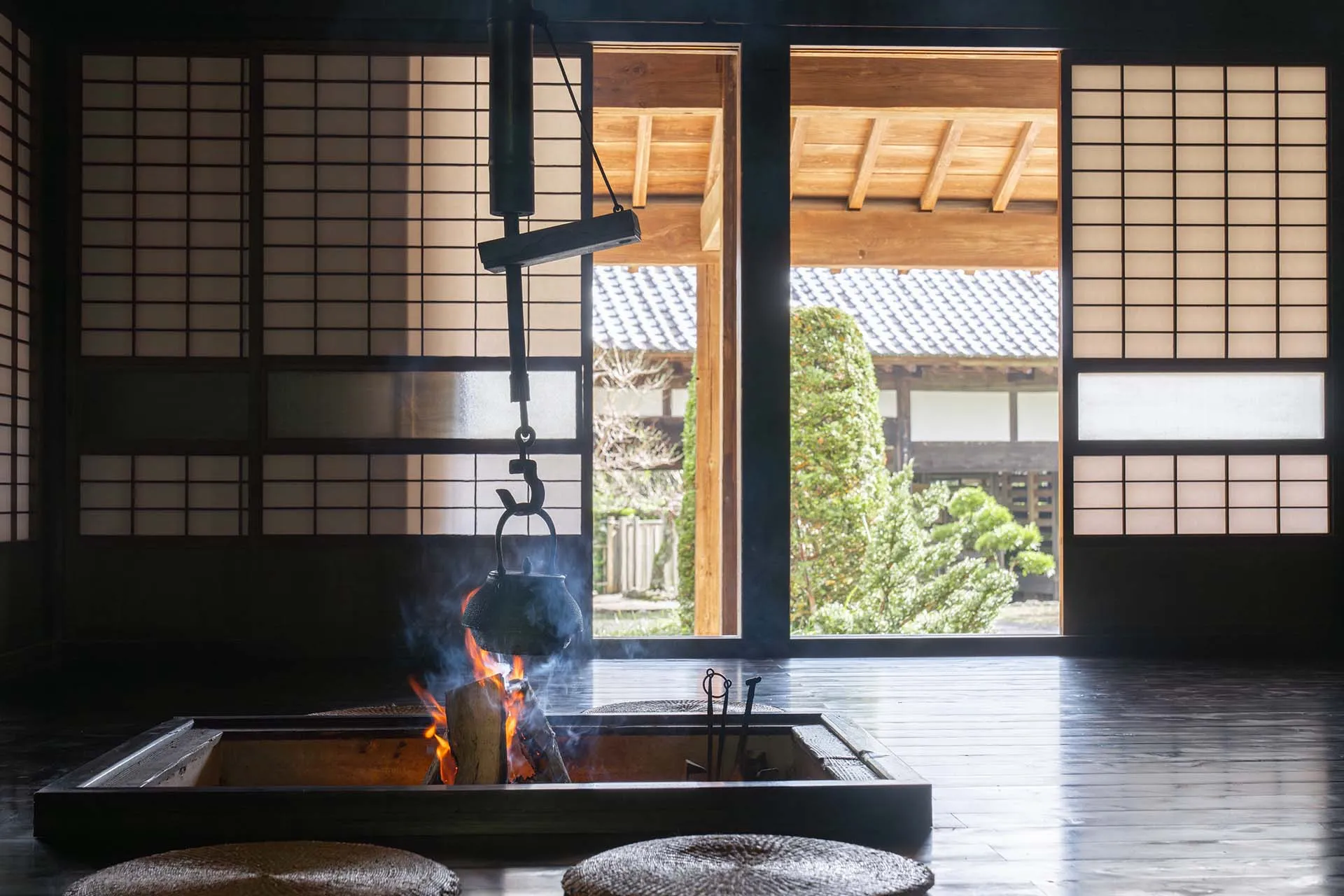 This home was built in the late-Edo period over 150 years ago.
This home was built in the late-Edo period over 150 years ago.
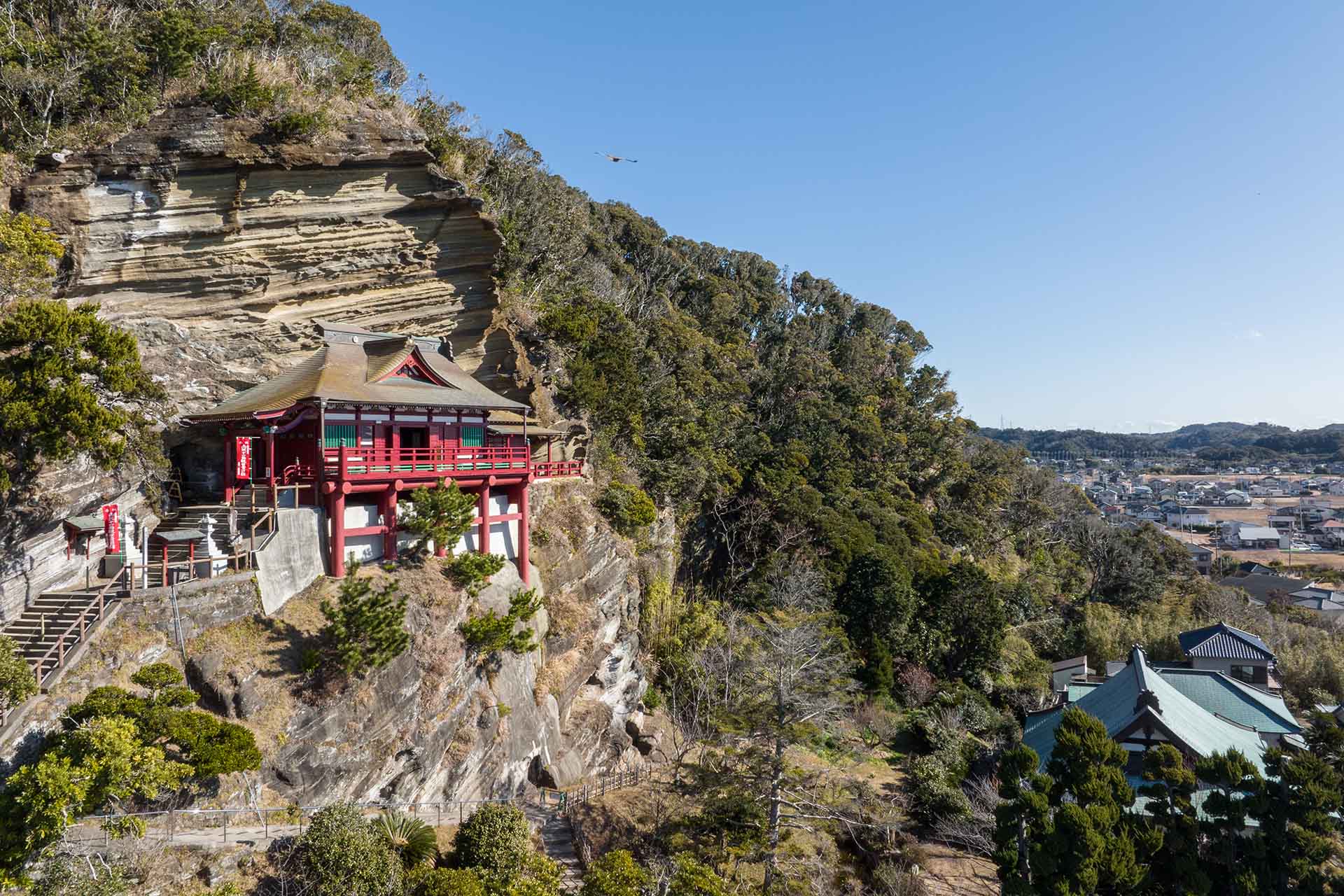 This temple hall sits atop a cliff where an Eleven-Faced Kannon was carved.
This temple hall sits atop a cliff where an Eleven-Faced Kannon was carved.
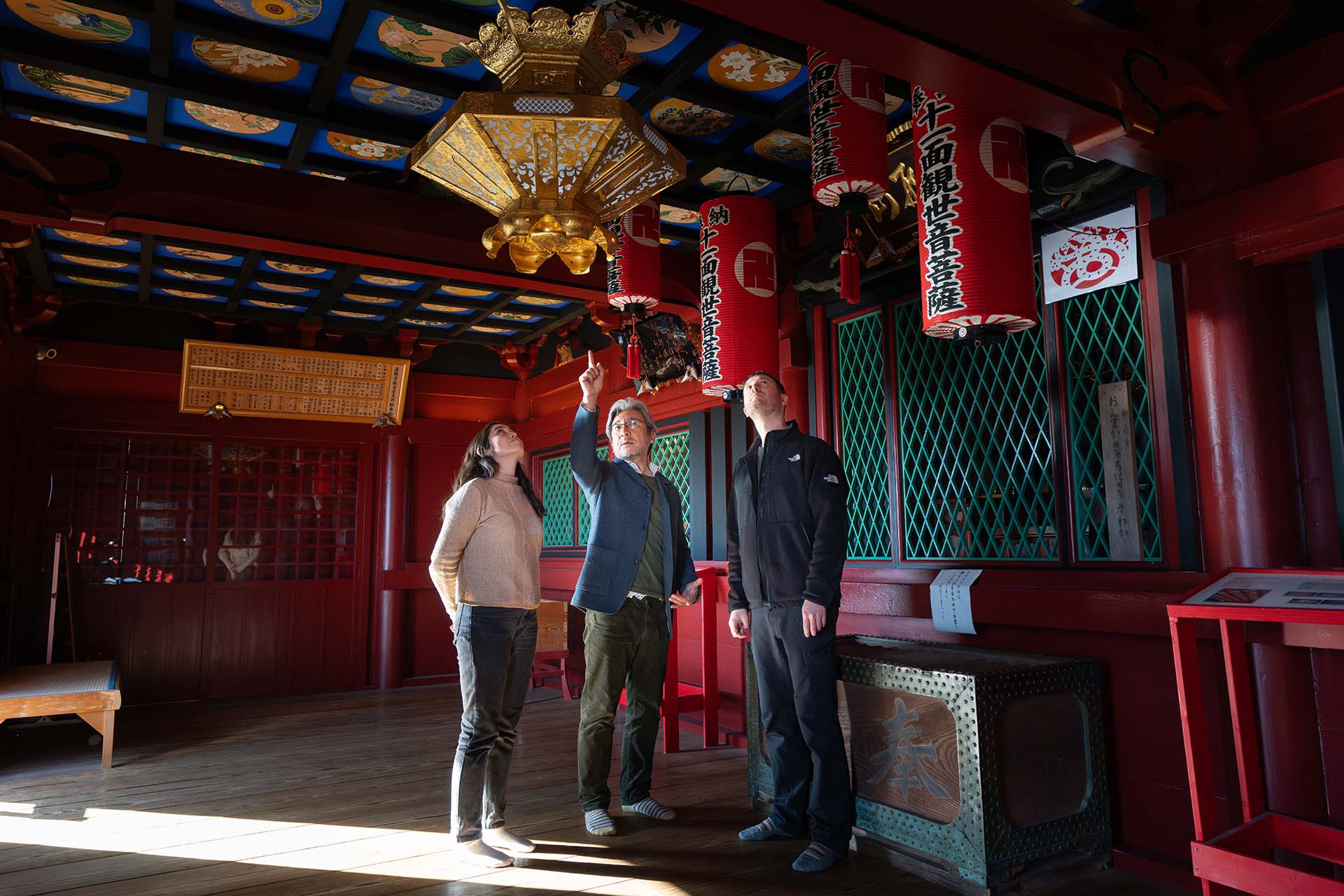 The ceiling is adorned with art featuring the flora of southern Chiba.
The ceiling is adorned with art featuring the flora of southern Chiba.
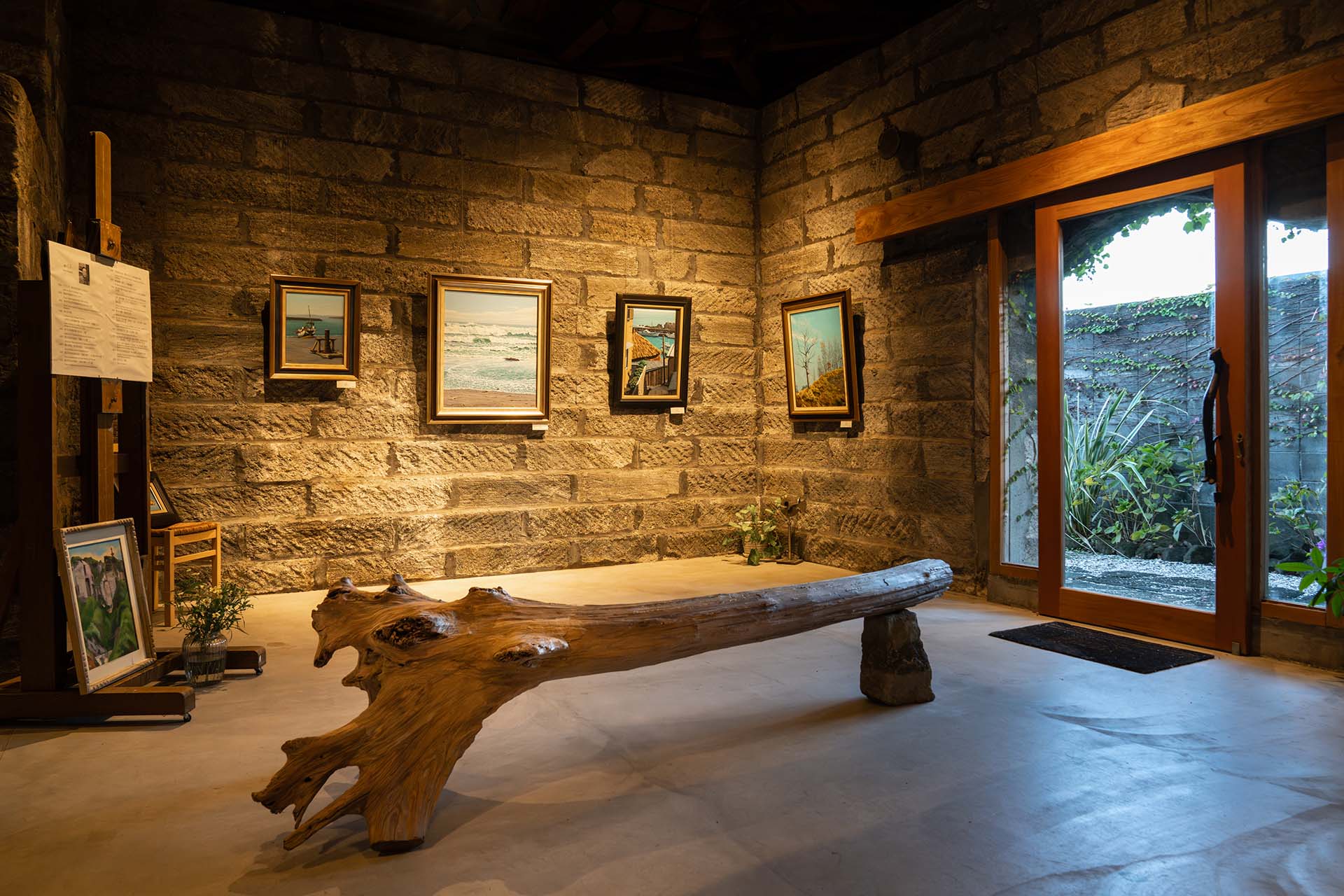 See works by local artist, the late Kazuo Mizoguchi, at Funakata Soko Gallery & Cafe.
See works by local artist, the late Kazuo Mizoguchi, at Funakata Soko Gallery & Cafe.
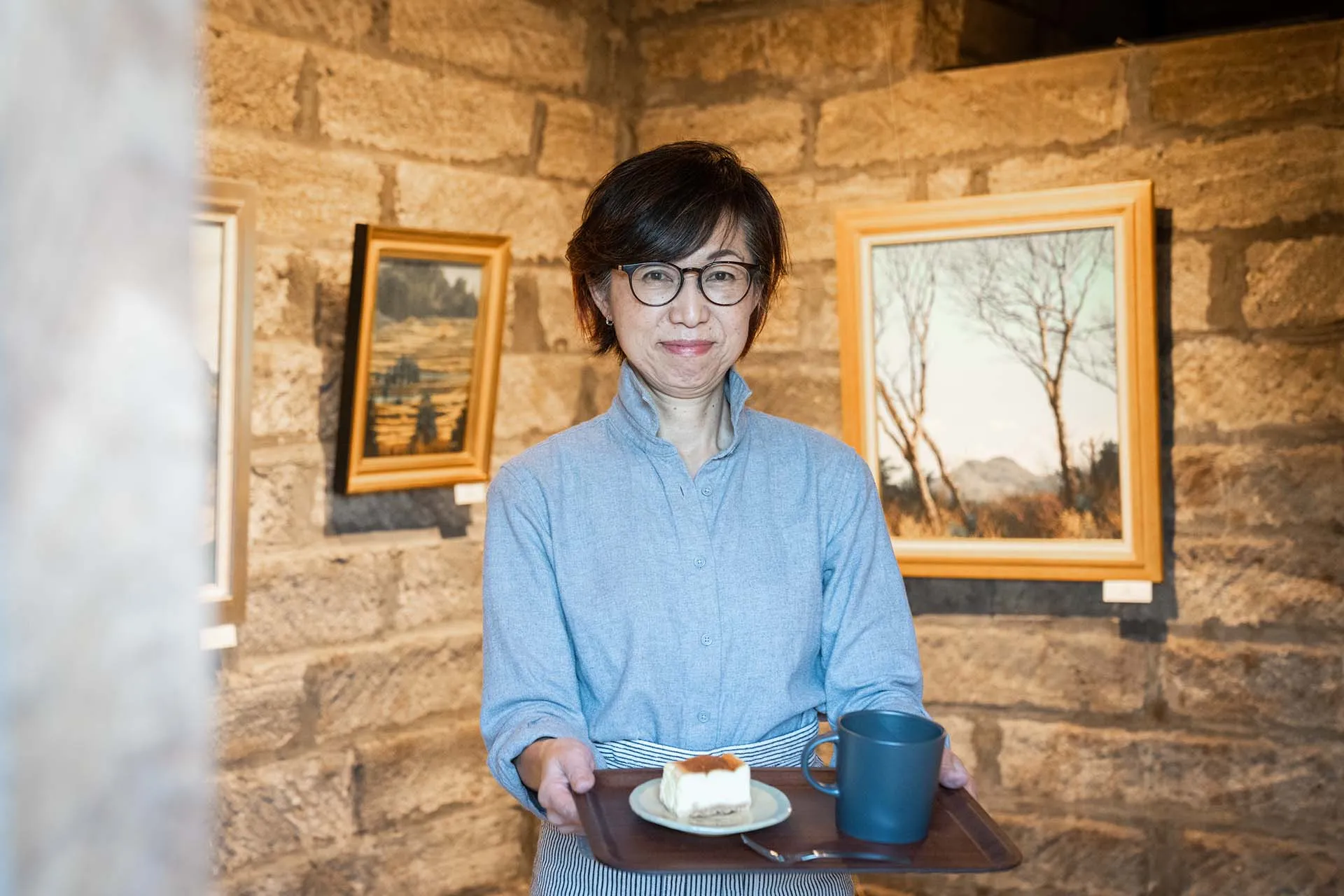 Meet the owner of Funakata Soko, Kaori Sasho, daughter of Kazuo Mizoguchi.
Meet the owner of Funakata Soko, Kaori Sasho, daughter of Kazuo Mizoguchi.
Meet local farmers who strive to make Chiba a hub for sustainable agriculture outside Tokyo and learn about the methods they employ to carry out this goal. You can also pick your own organic produce, then go to a local farmhouse to eat a locally-sourced meal. For vegetarian and vegan participants, Boso Adventure Tours offers a vegan dining experience at Lungta.
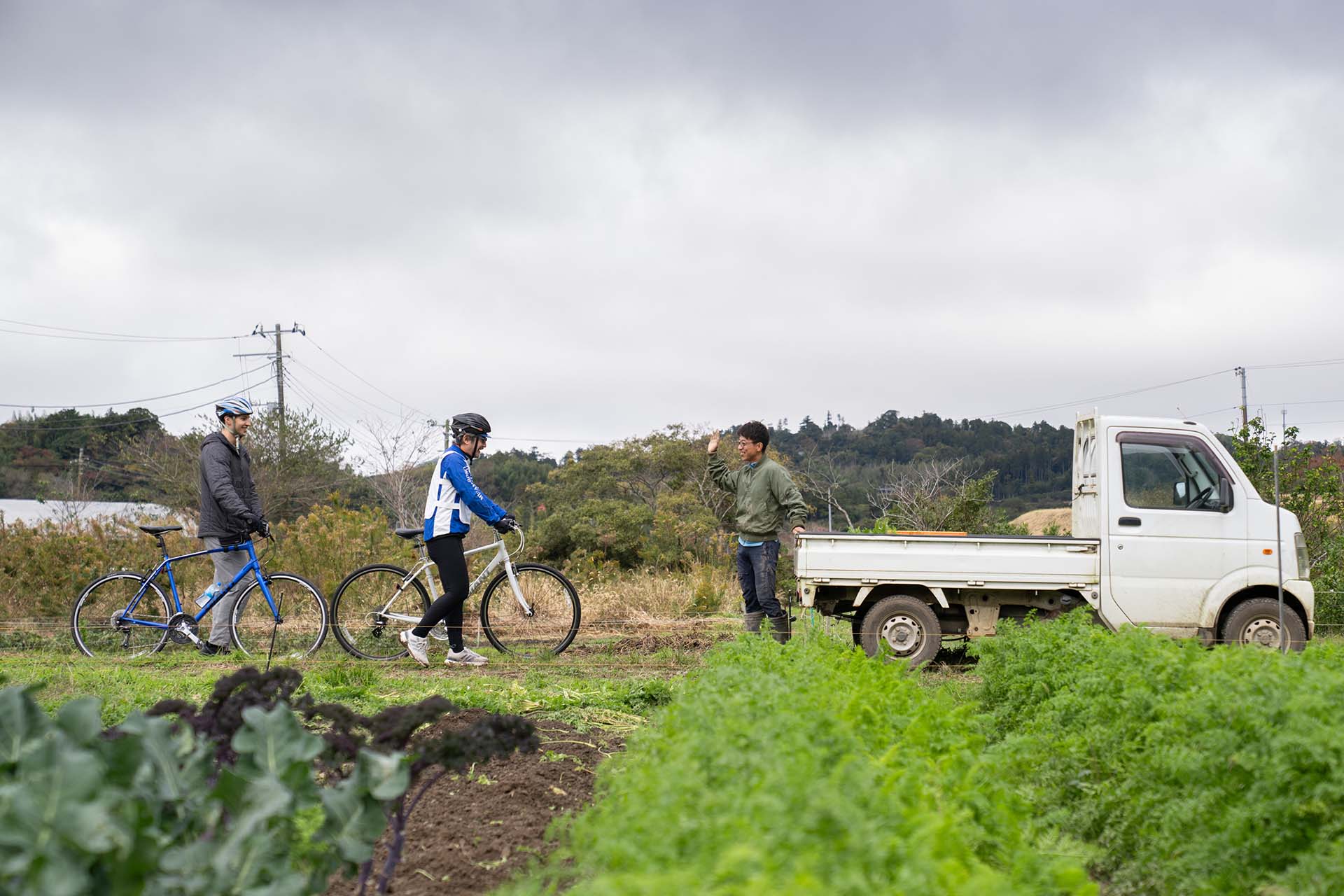 Visit Aoki-san at Satoyama Farm 8.
Visit Aoki-san at Satoyama Farm 8.
 Harvest organic produce alongside Aoki-san.
Harvest organic produce alongside Aoki-san.
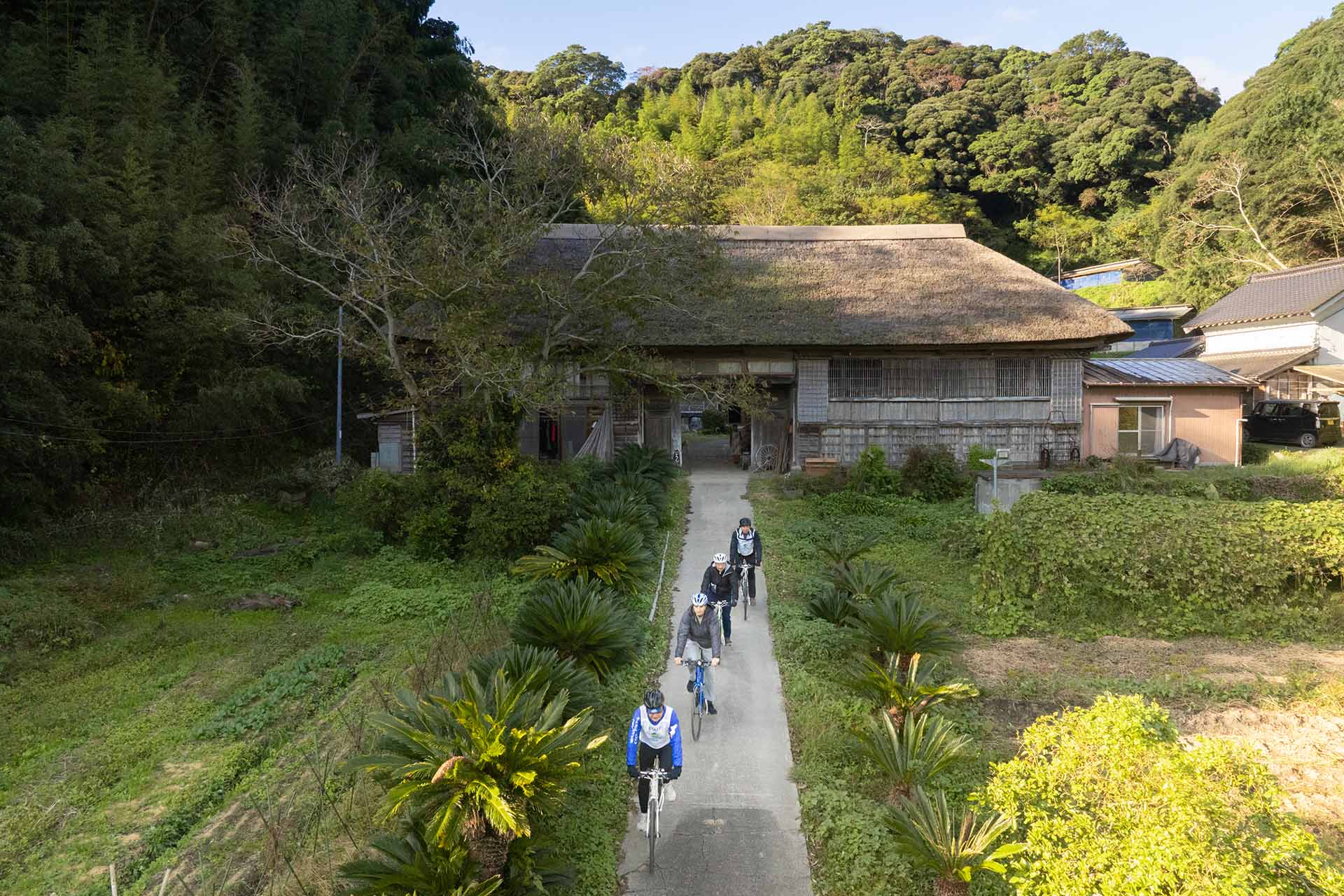 Next, head over to Jiroemu, a farmhouse restaurant, for lunch.
Next, head over to Jiroemu, a farmhouse restaurant, for lunch.
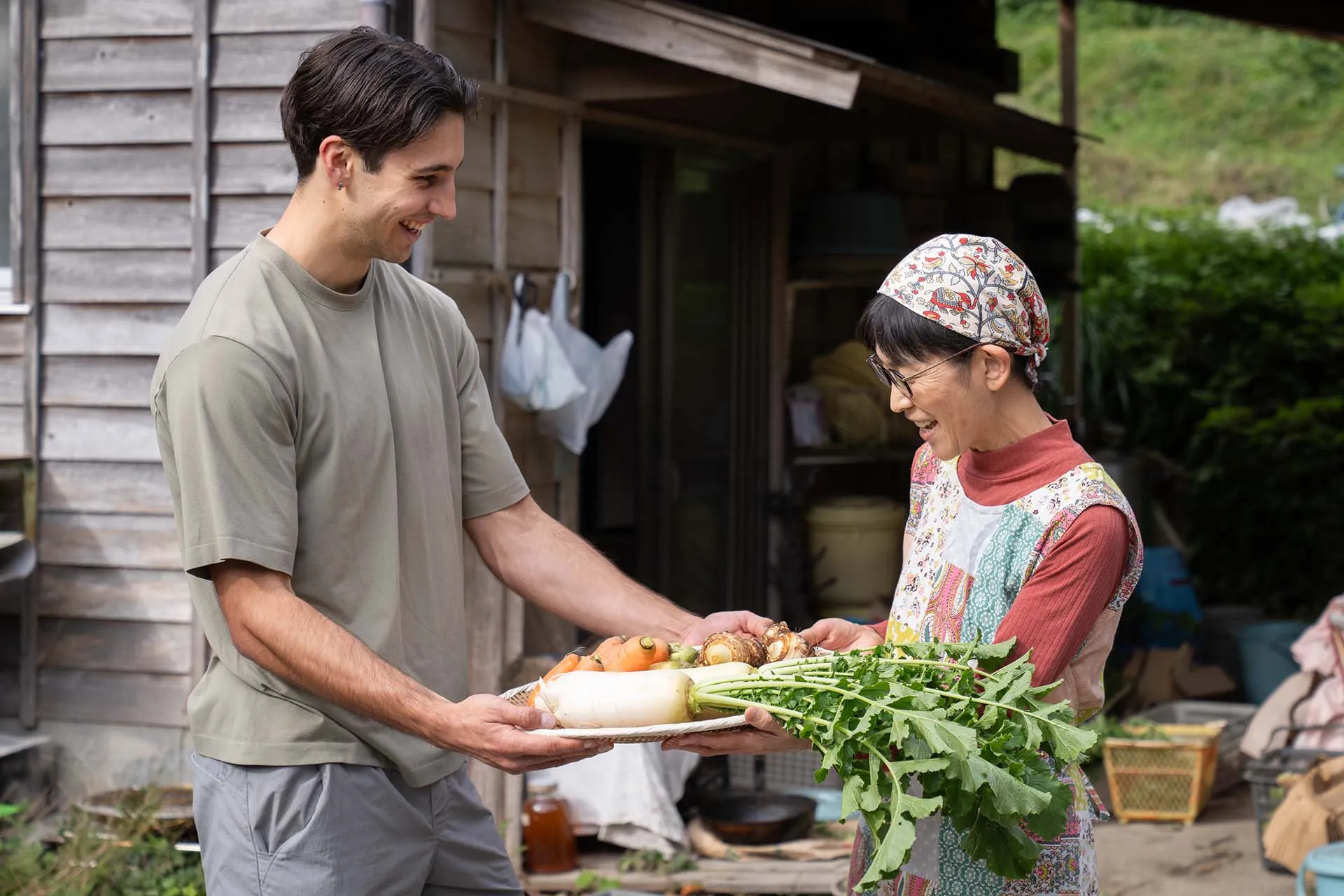 Hand your freshly-picked veggies to the 14th-generation owner, Inaba-san.
Hand your freshly-picked veggies to the 14th-generation owner, Inaba-san.
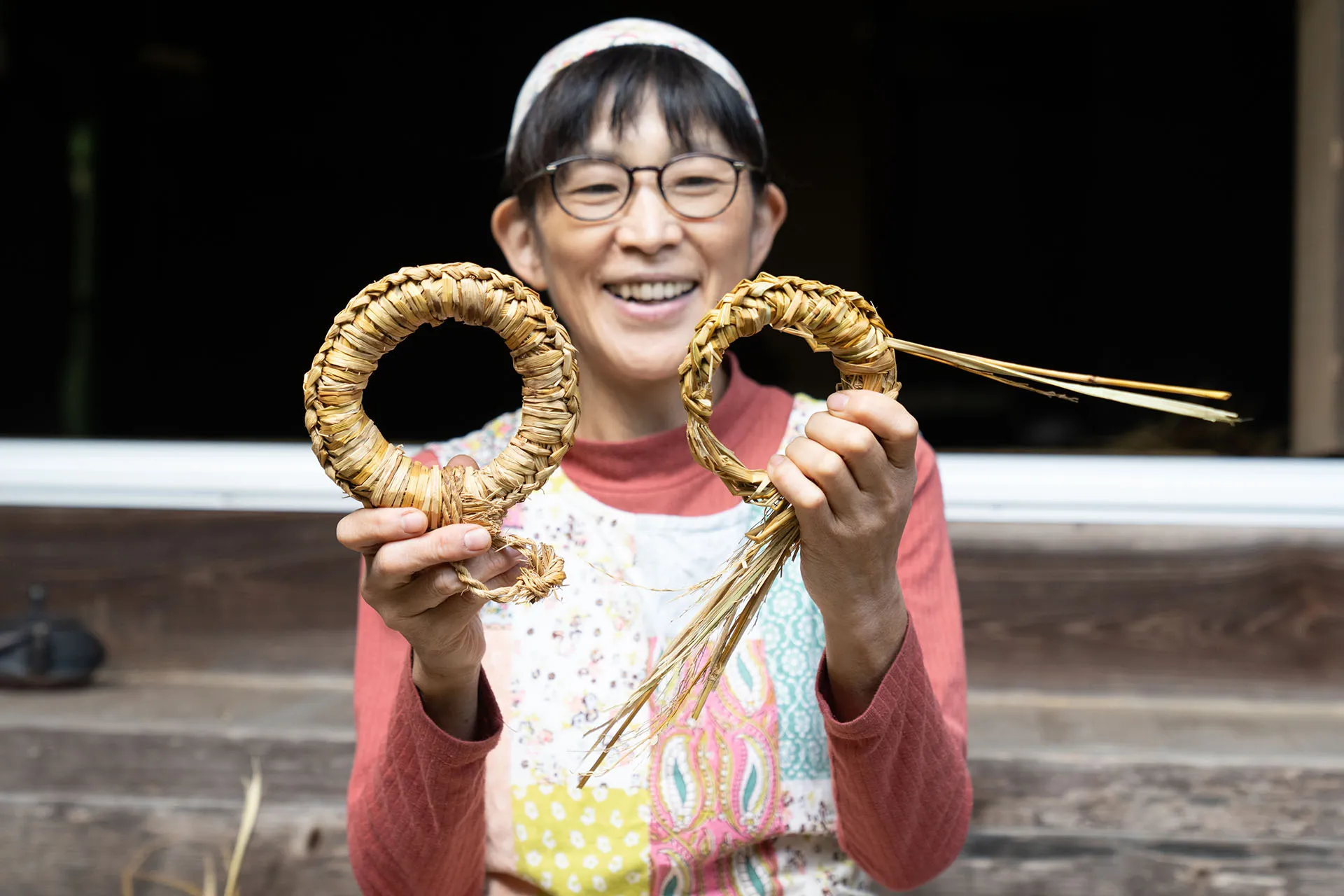 While you wait for lunch, you can make handmade straw crafts alongside Inaba-san.
While you wait for lunch, you can make handmade straw crafts alongside Inaba-san.
 Lastly, enjoy a homemade meal made from your hand-picked veggies, other locally-sourced produce, and free range poultry.
Lastly, enjoy a homemade meal made from your hand-picked veggies, other locally-sourced produce, and free range poultry.
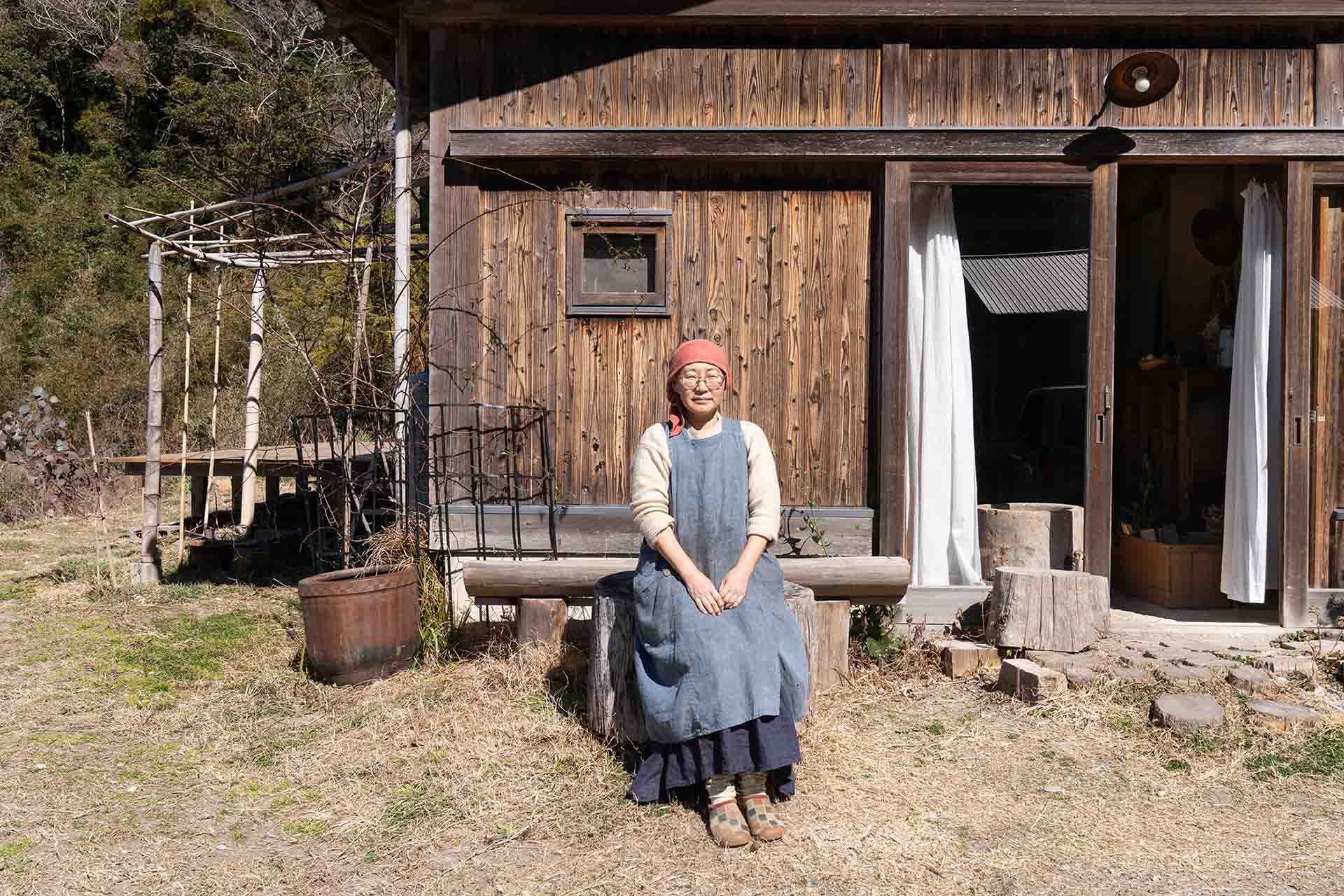 Yoneyama-san runs Lungta on her property located deep in the mountains of Boso.
Yoneyama-san runs Lungta on her property located deep in the mountains of Boso.
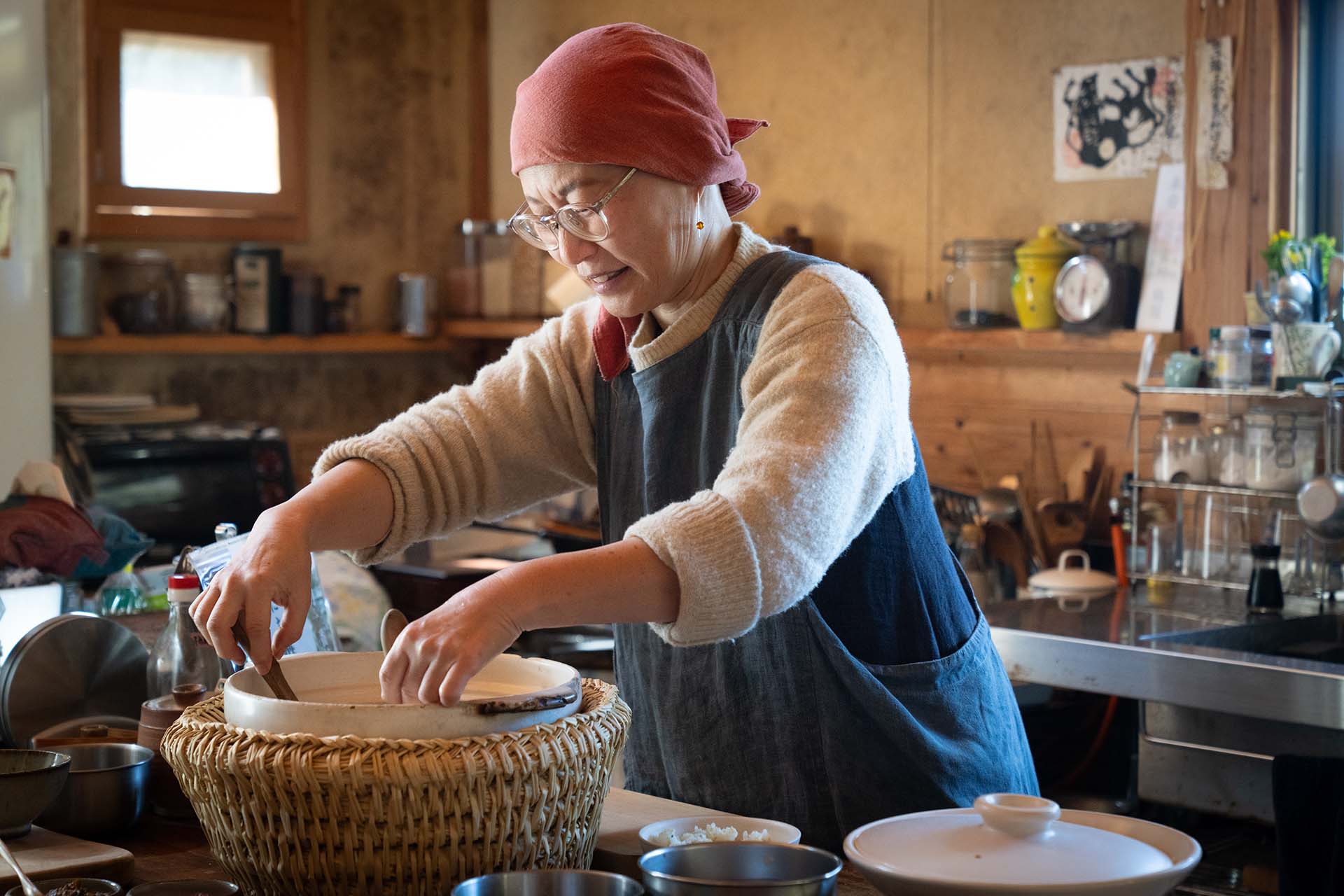 With a desire to live sustainably in nature, she moved to this property with her family in 2007.
With a desire to live sustainably in nature, she moved to this property with her family in 2007.
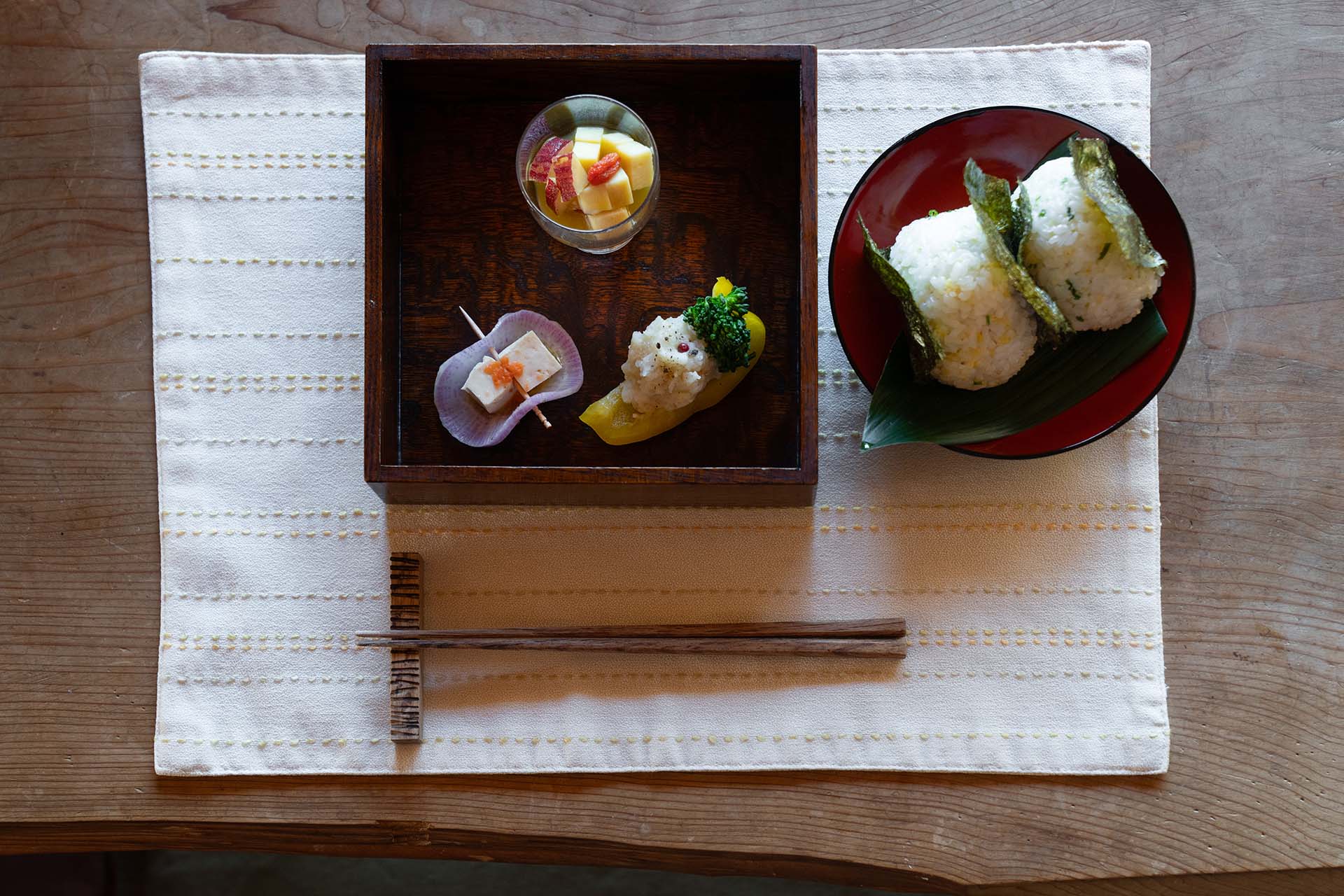 She welcomed us in her kitchen and helped us craft the onigiri rice balls pictured here on the right.
She welcomed us in her kitchen and helped us craft the onigiri rice balls pictured here on the right.
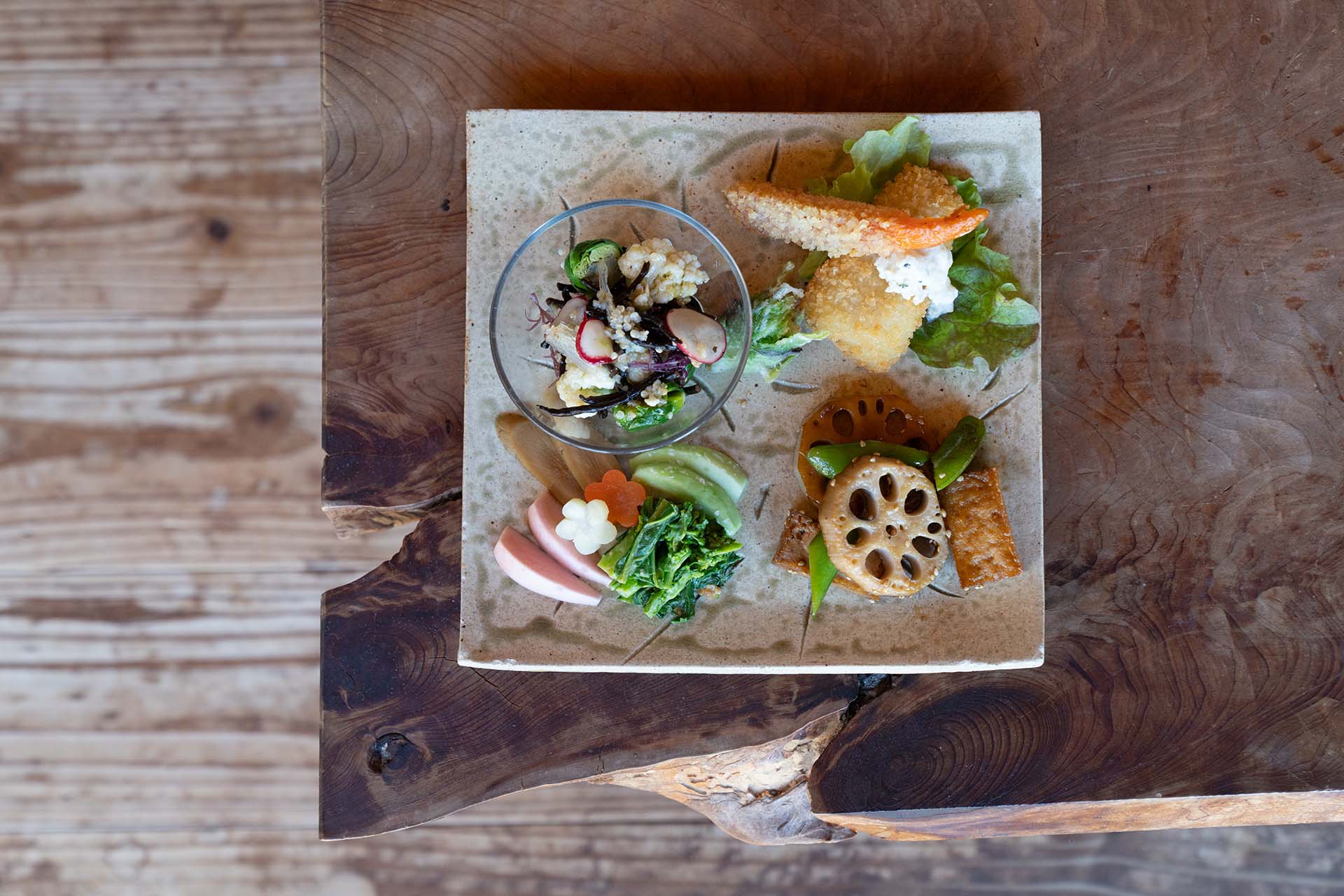 The 100% plant-based dishes are made with vibrant grains and locally sourced fresh seasonal vegetables.
The 100% plant-based dishes are made with vibrant grains and locally sourced fresh seasonal vegetables.
For tour participants hoping to stay the night, Boso Adventure Tours partners with lodging facilities around the Boso area. Featured first below is Sora, a renovated kominka country home turned luxury accommodation located down the street from the Heguri Hub. Guests can also upgrade their dining plan with exclusive experiences like the lesson with a sushi chef featured in the photos below.
Another lodging facility Boso Adventure Tours partners with is Kinokuniya, a quaint luxury inn nestled in a seaside community, about 15-minutes from the foot of Mt. Nokogiri. Guests here can enjoy outdoor onsen baths, as well as private baths attached to their rooms. The course meals come with fresh locally caught seafood, brought in from the local fishing port on a daily basis.
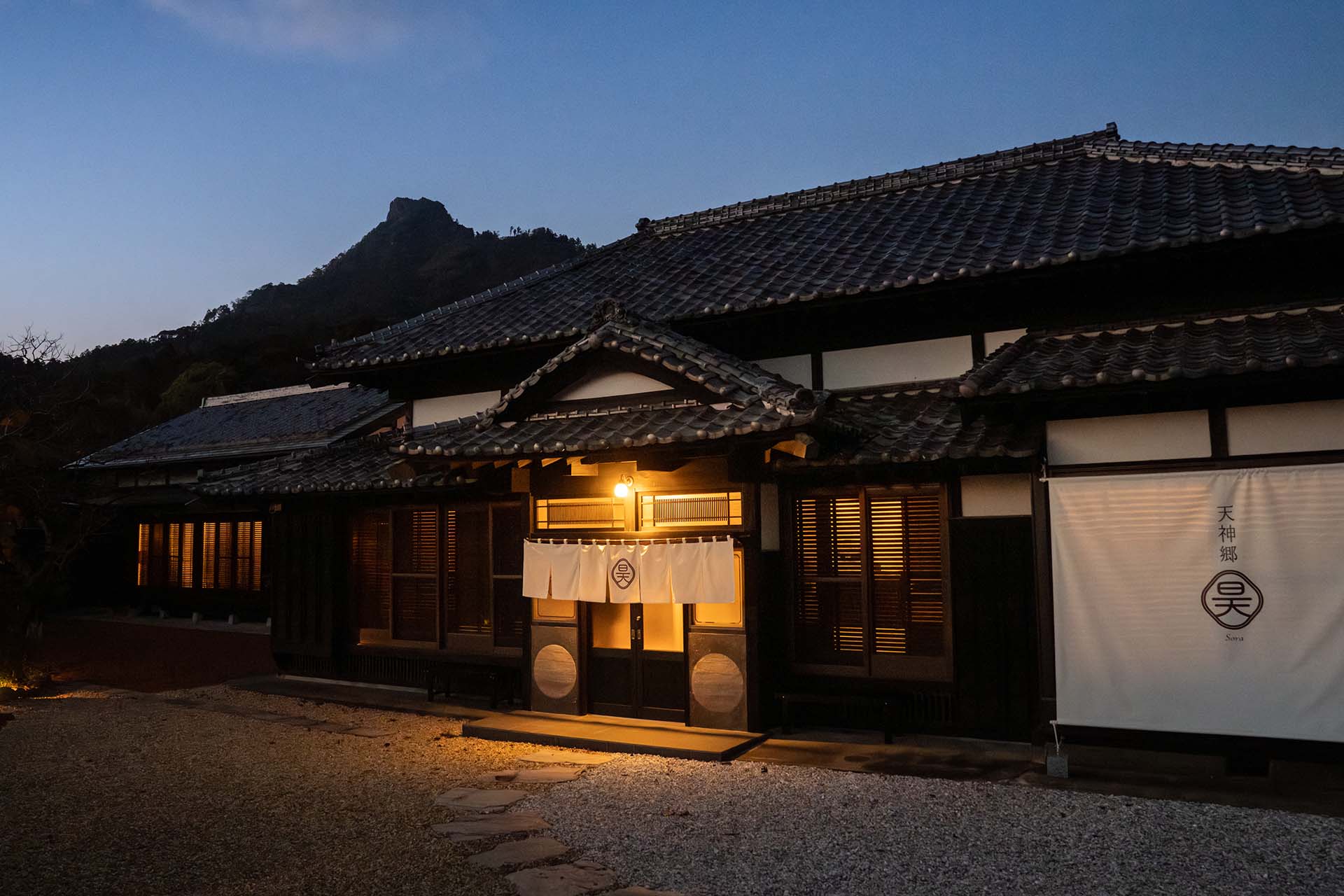 Luxury accommodation at Sora.
Luxury accommodation at Sora.
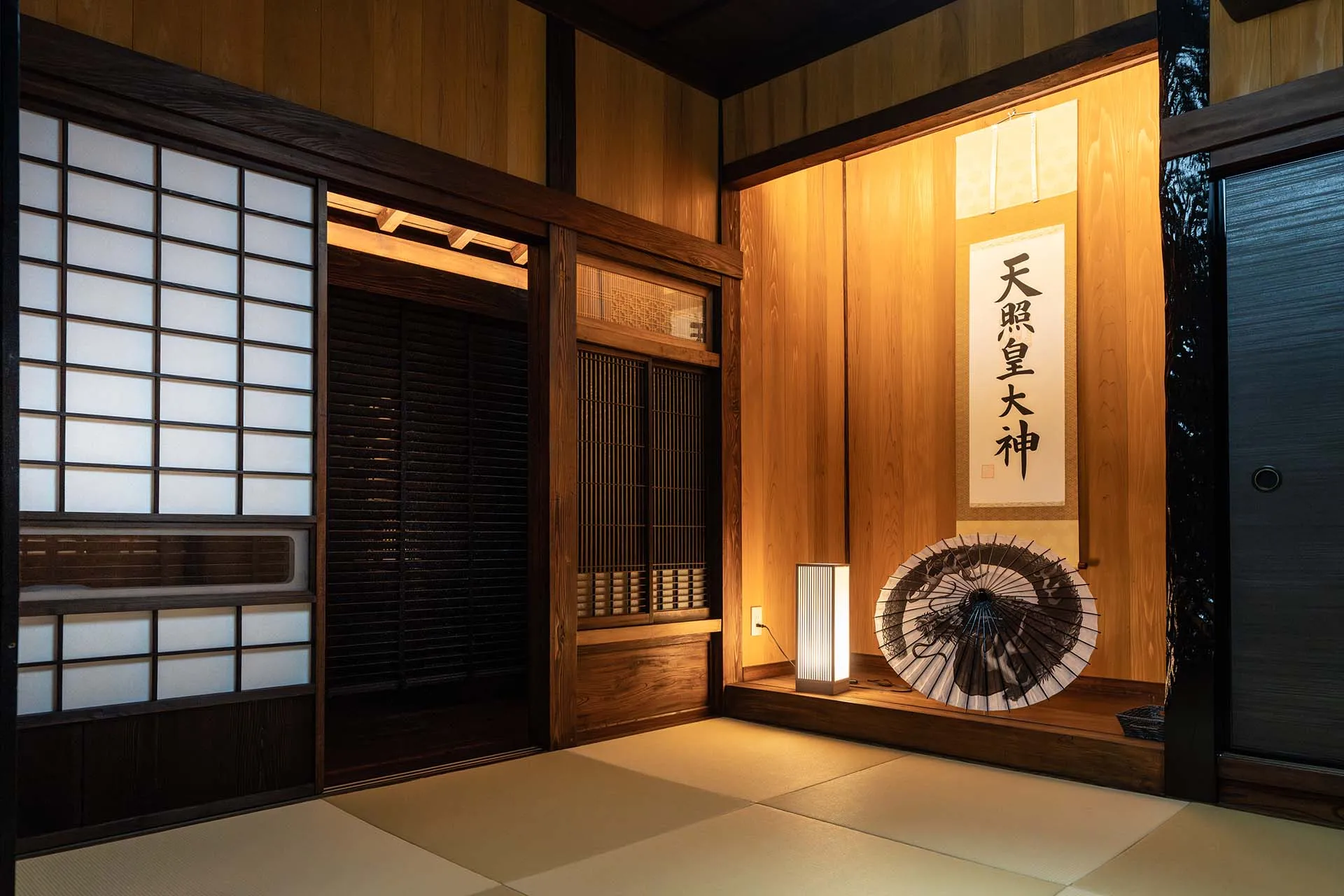 Sora's classic Japanese-style interior.
Sora's classic Japanese-style interior.
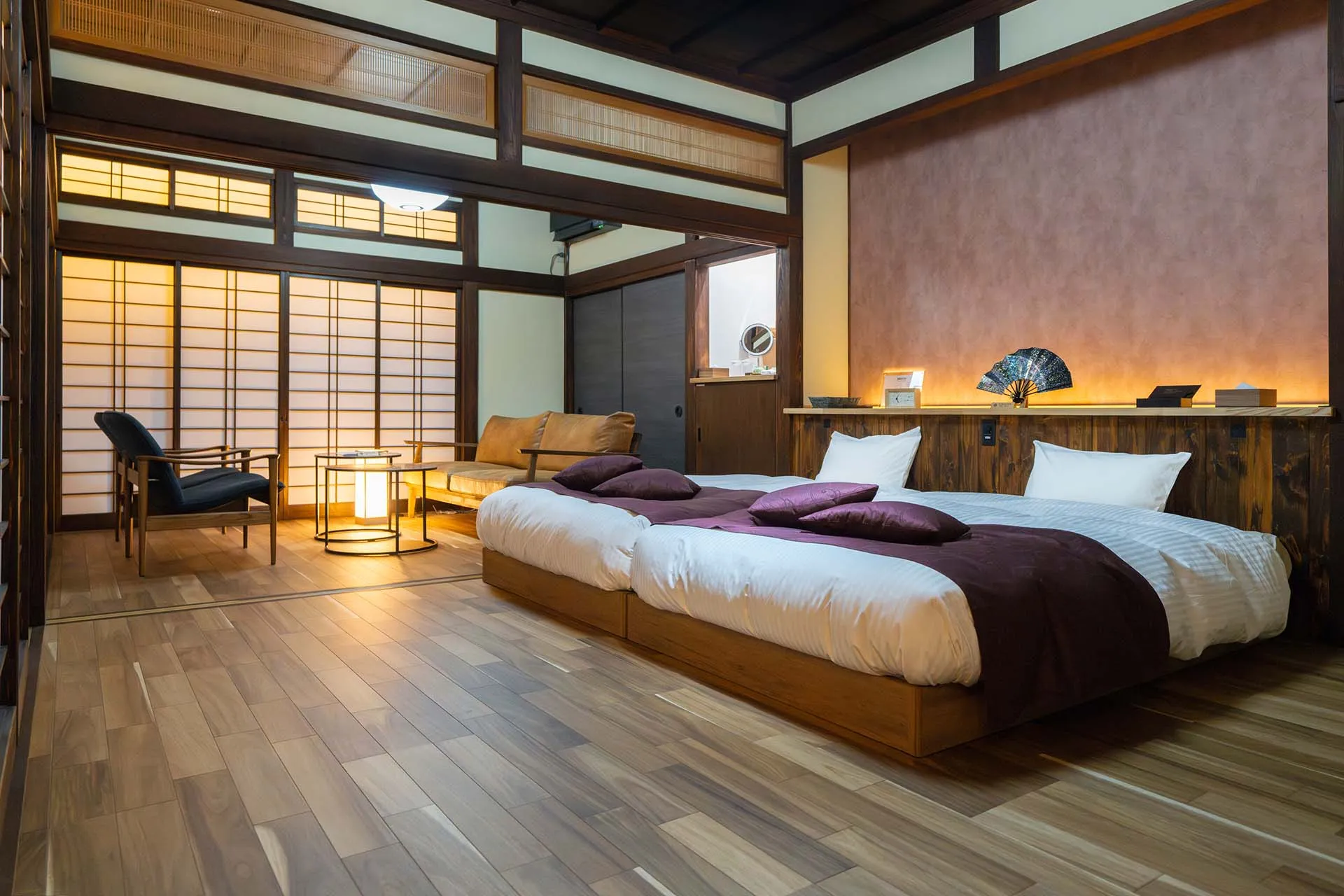 Sora's master bedroom.
Sora's master bedroom.
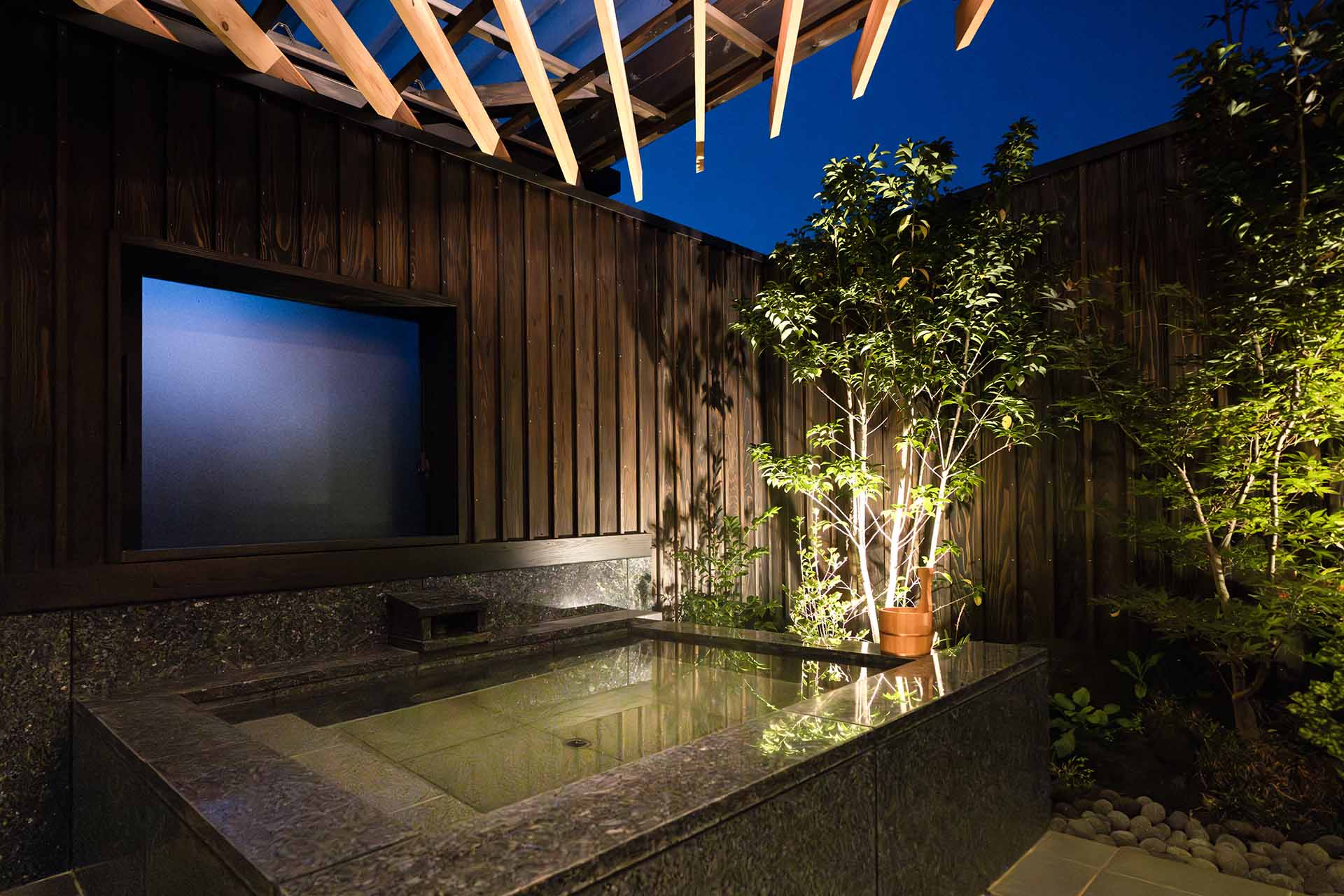 Soak in Sora's private outdoor bath.
Soak in Sora's private outdoor bath.
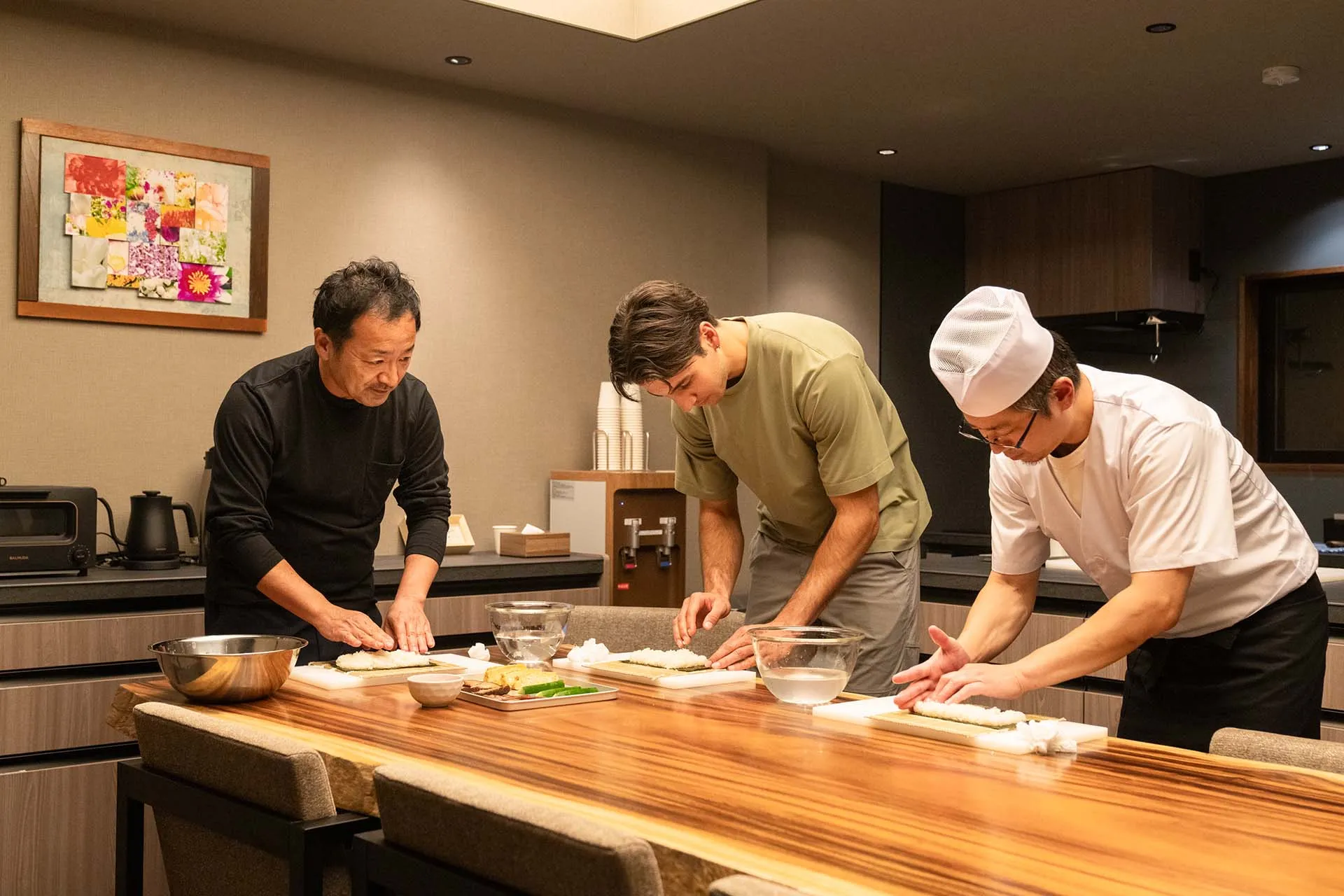 Private sushi making class.
Private sushi making class.
 Enjoy an exclusive meal prepared by the chef.
Enjoy an exclusive meal prepared by the chef.
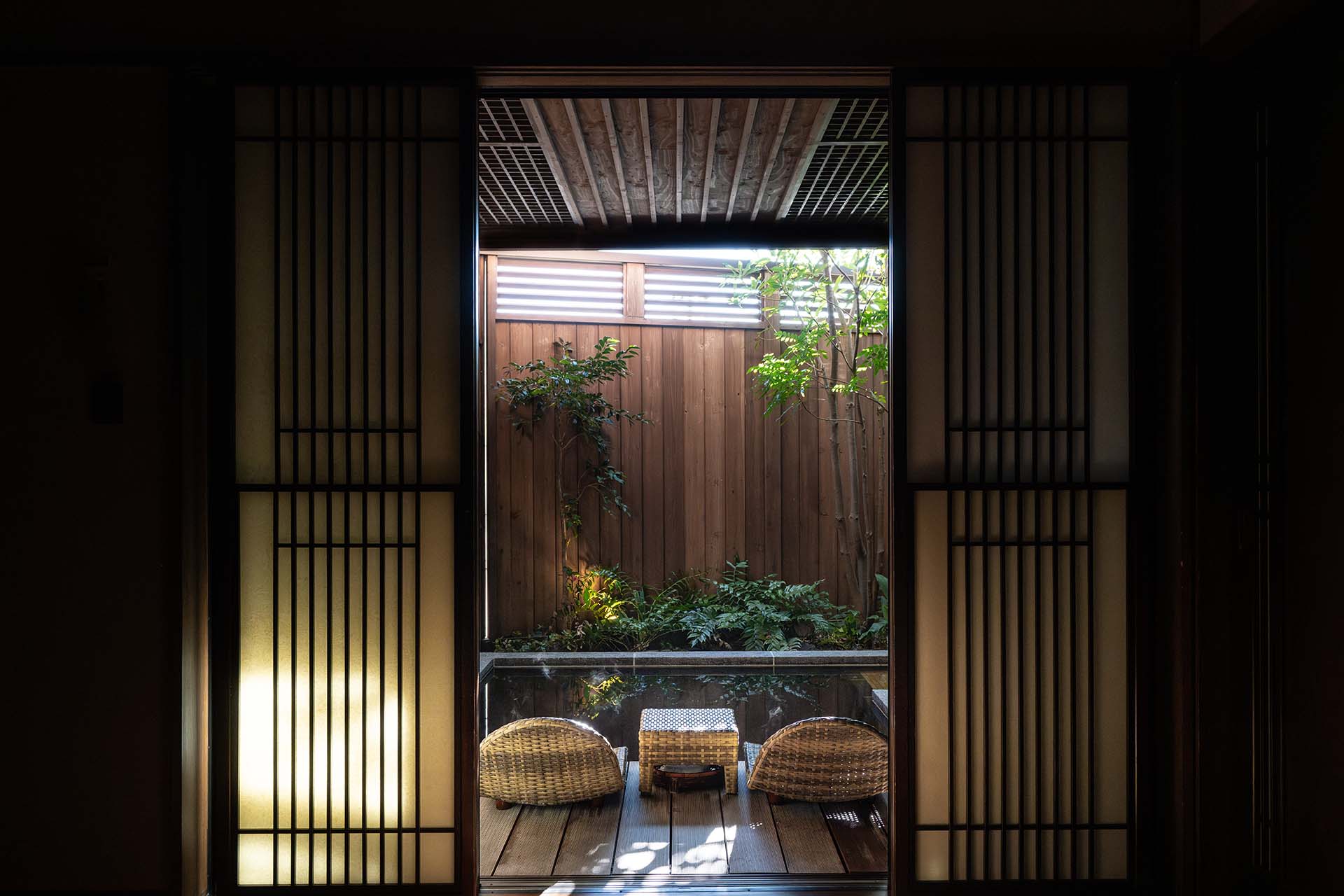 The private bath attached to our room.
The private bath attached to our room.
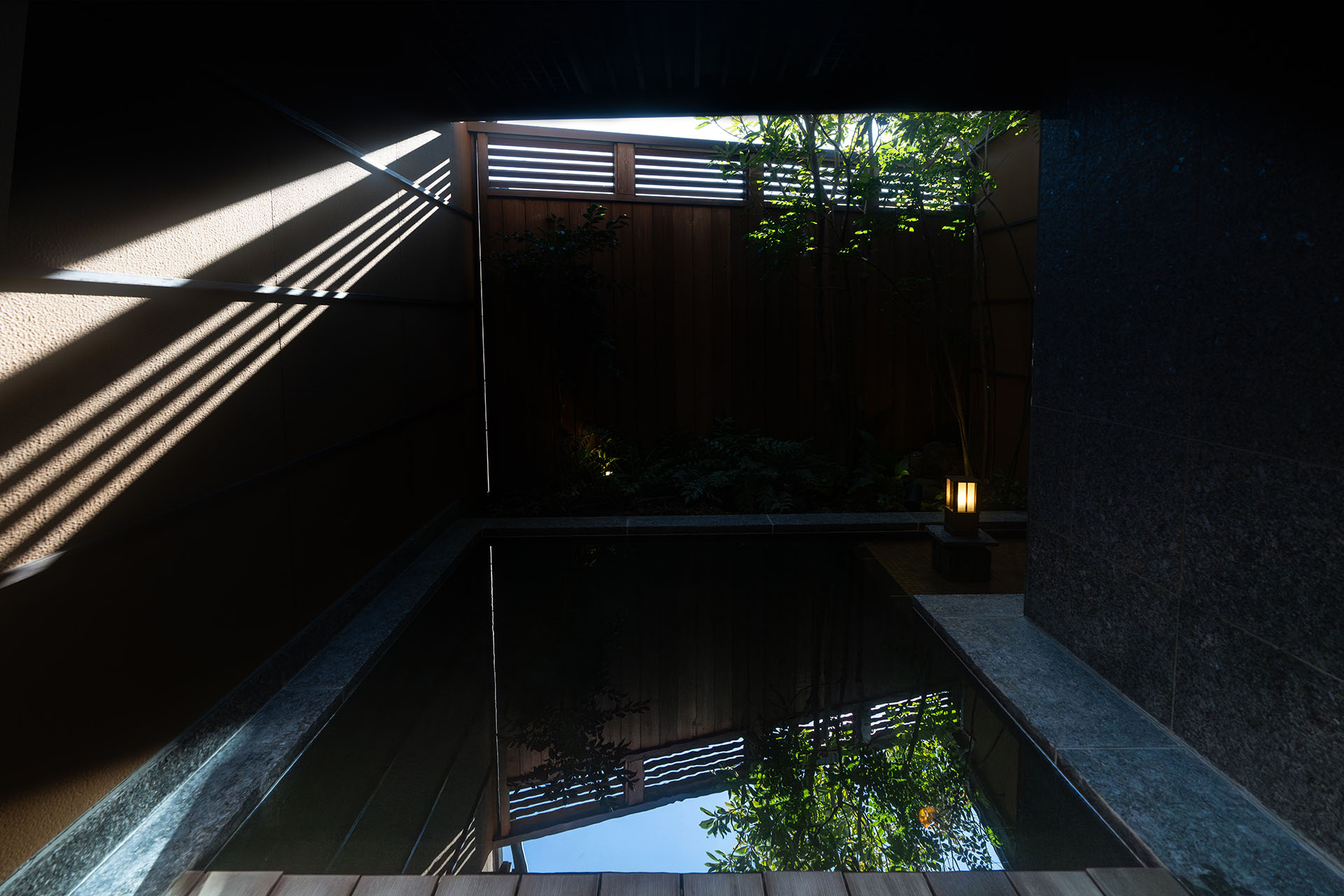 A closer look at the warm onsen waters.
A closer look at the warm onsen waters.
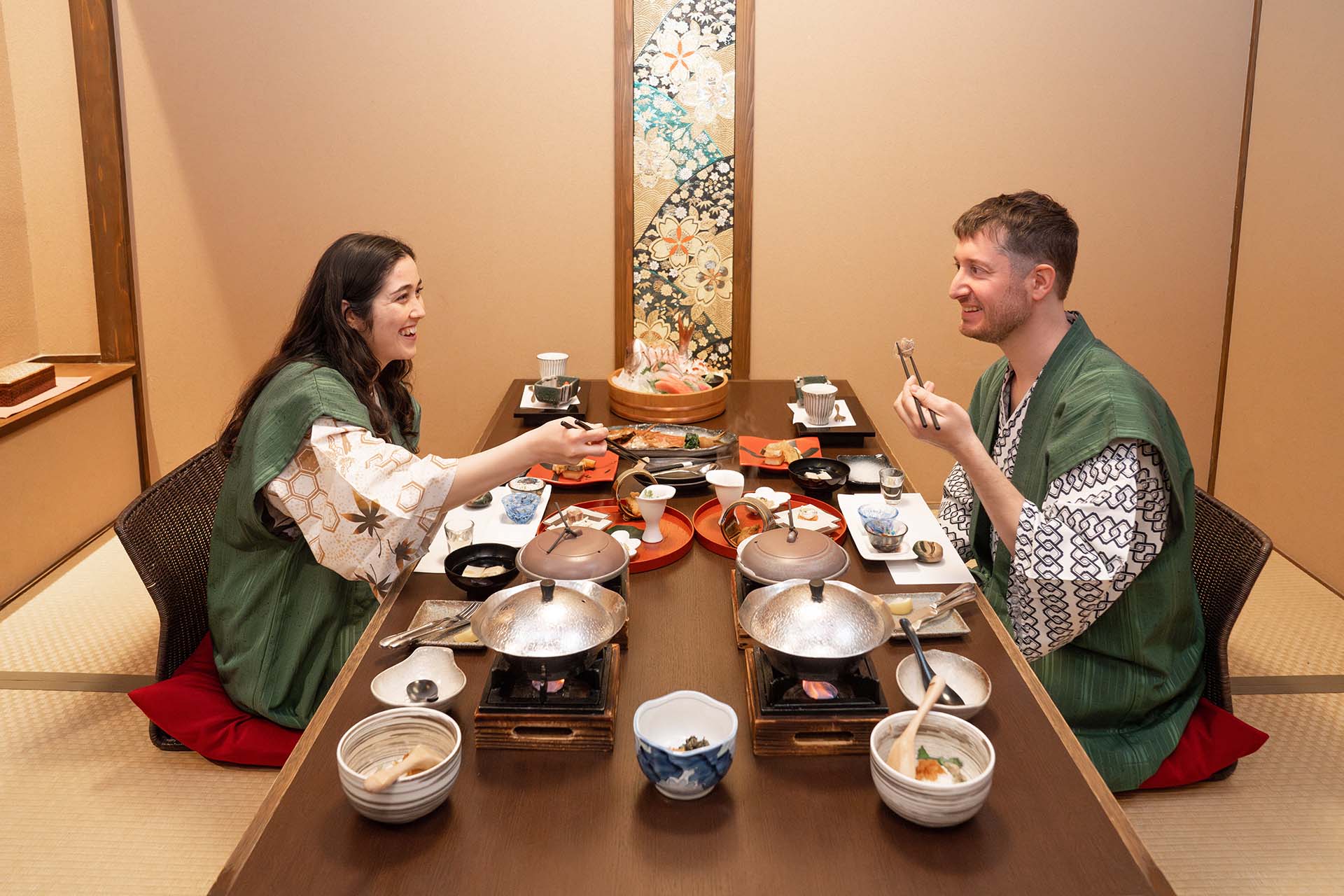 Enjoying the luxurious course dinner in our rooms.
Enjoying the luxurious course dinner in our rooms.
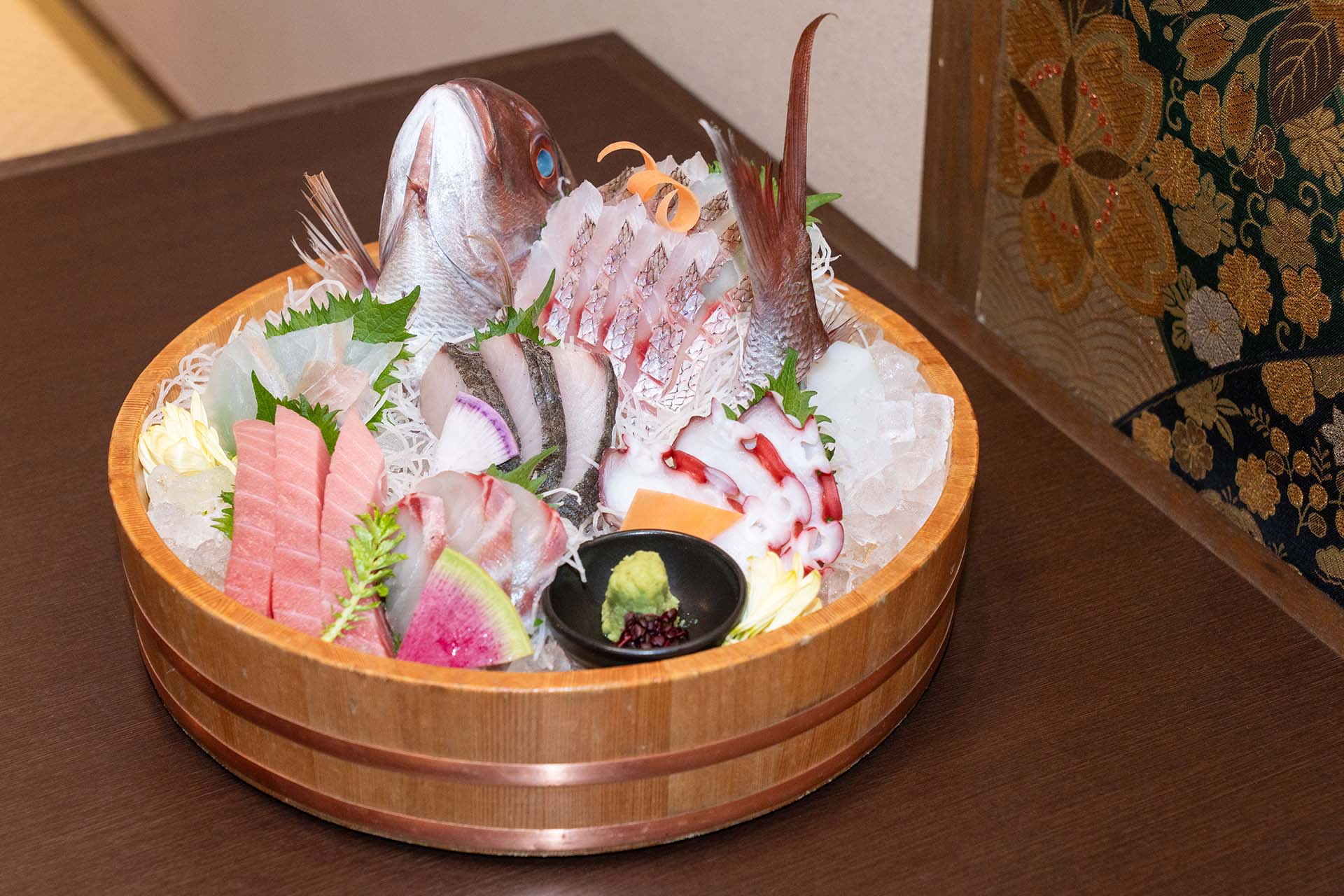 Fresh seafood is brought in every morning from the local fishing port.
Fresh seafood is brought in every morning from the local fishing port.
224-3 Hegurinaka, Minamiboso City
(Ten minutes from the Kyonan-Tomiyama Interchange on the Tateyama Expressway, ten minutes by car from the “Highway Oasis Furari” highway bus stop, or fifteen minutes by car from JR Iwai Station.)
+81-470-58-0312